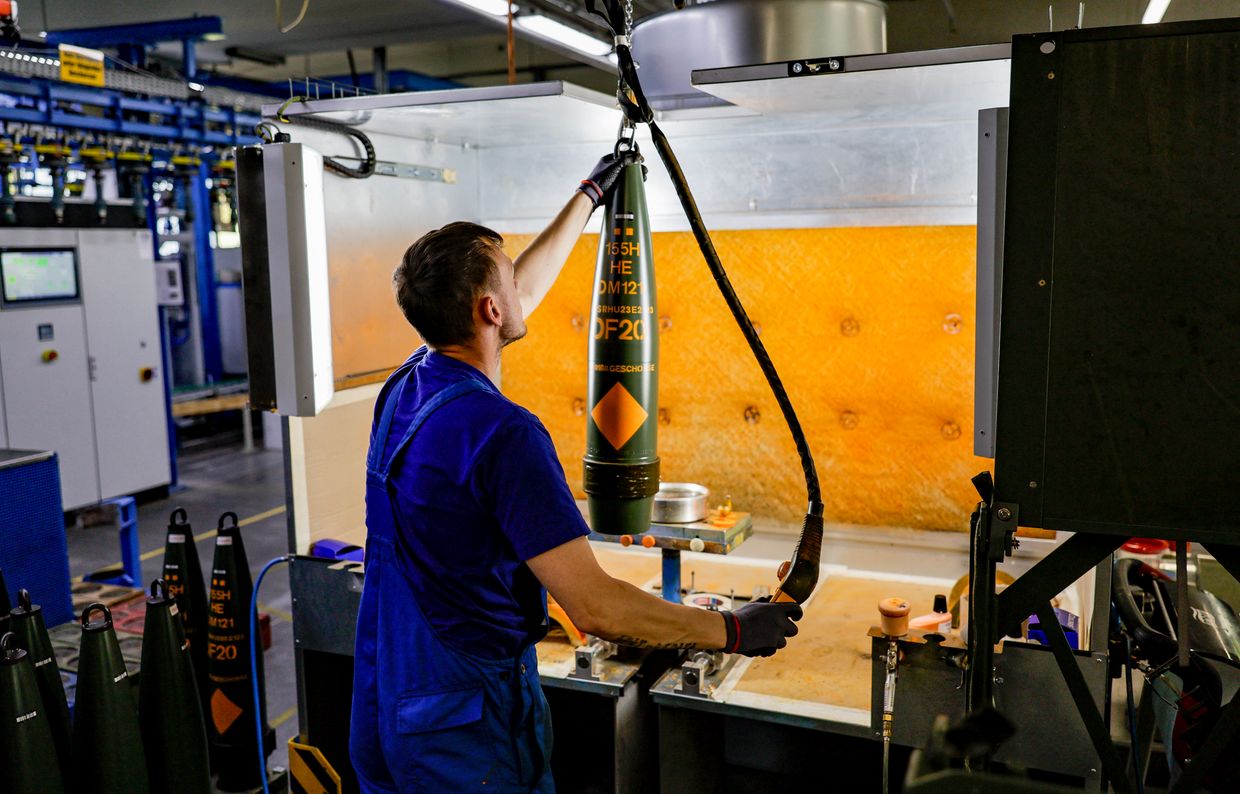The Police Found Messages After Kirk’s Killing. What They Mean Is Unclear.

© Tess Crowley/The Deseret News, via Associated Press


© Tess Crowley/The Deseret News, via Associated Press
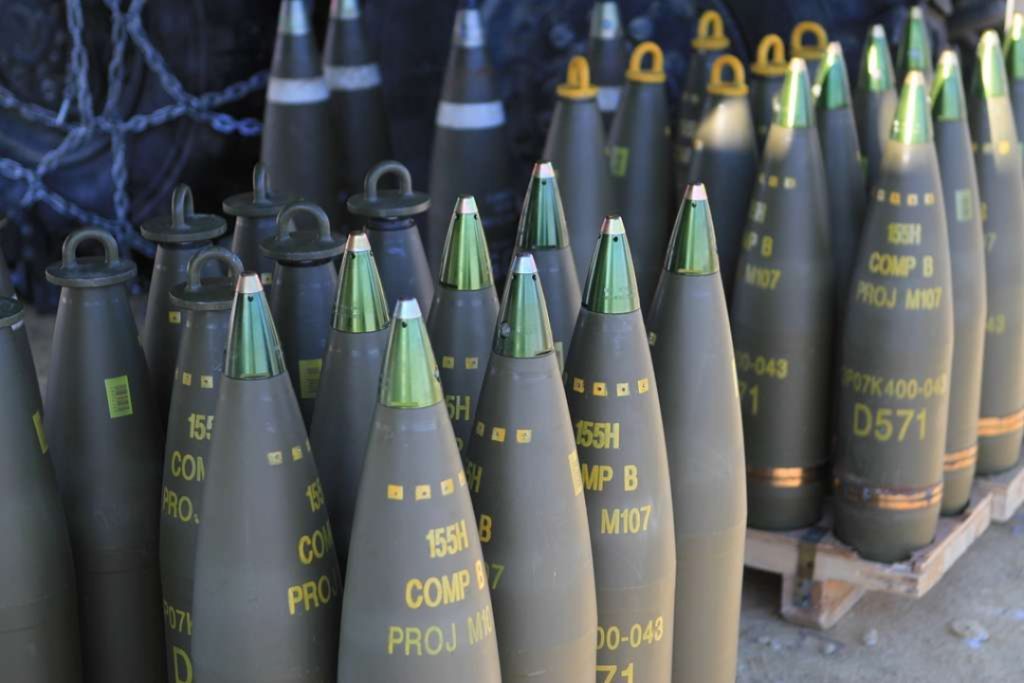

Ukrainian Defense Minister Shmyhal announced on 11 September that German defense giant Rheinmetall will build a new ammunition plant in Ukraine, following productive talks in London.
Ukraine’s Defense Minister Shmyhal met with Rheinmetall AG CEO Armin Papperger in London during the Defense Security and Equipment International Exhibition and Conference. The meeting finalized procedures for launching new joint production capabilities between the two nations.
Shmyhal confirmed that land was allocated on 9 September in a secure Ukrainian region. The new facility will manufacture Rheinmetall shells specifically for Ukraine’s Defense Forces needs. This development represents a significant expansion of the existing cooperation between Ukraine and the German defense contractor.
The partnership extends beyond shell production into multiple defense sectors. Both sides discussed developing capabilities for armored vehicle repair and manufacturing within Ukraine. Rheinmetall’s product lineup includes several new systems that could strengthen Ukrainian Defense Forces capabilities.
Air defense cooperation formed another key discussion point during the London talks. Shmyhal and Papperger explored joint development of enhanced anti-drone solutions. These systems would help Ukrainian forces more effectively counter enemy drone threats.


MP Röwekamp emphasized that Ukraine should receive modern air defense systems and equipment to strike targets on Russian territory, and that coordination within NATO should allow responding to threats in the airspace of allied countries.
Amid the ongoing Russo-Ukrainian war, providing Ukraine with such capabilities becomes particularly relevant after the incident in which some Russian UAVs entered Polish airspace. To protect key logistical hubs, such as Rzeszów Airport, the Bundeswehr deployed Patriot air defense systems and 200 soldiers, while Dutch F-35s shot down at least three drones.
The head of the Bundestag Defense Committee, Thomas Röwekamp, told the German magazine Spiegel that NATO needs to act more decisively against Russian drones. He stressed the need to shoot down drones over Ukraine and to strike production sites and launch platforms in Russia.
According to him, mass UAV attacks create very serious challenges for air defense, and military capabilities in this area should be expanded. Germany should increase its contribution and help Ukraine acquire modern air defense systems and other tools to counter drones.
Röwekamp highlighted the importance of NATO coordination to determine when and over whose territory threats can be countered:
“There must be a possibility, with the consent of the affected country, to neutralize drones that threaten NATO territory, even in their airspace.”
Ukrainian President Volodymyr Zelenskyy has repeatedly called for a coordinated approach to protect Ukrainian airspace, proposing to work with partners to find solutions that minimize escalation. German Defense Minister Boris Pistorius has refrained from commenting on the possibility of shooting down drones over Ukraine, emphasizing the need for caution and coordination with allies.
Meanwhile, Germany and other partners are actively supplying Ukraine with modern air defense systems and assisting in the development of long-range UAVs. This allows not only repelling attacks but also planning actions against the sources of threats on Russian territory.


© Pool photo by Ben Stansall


© Kenny Holston/The New York Times
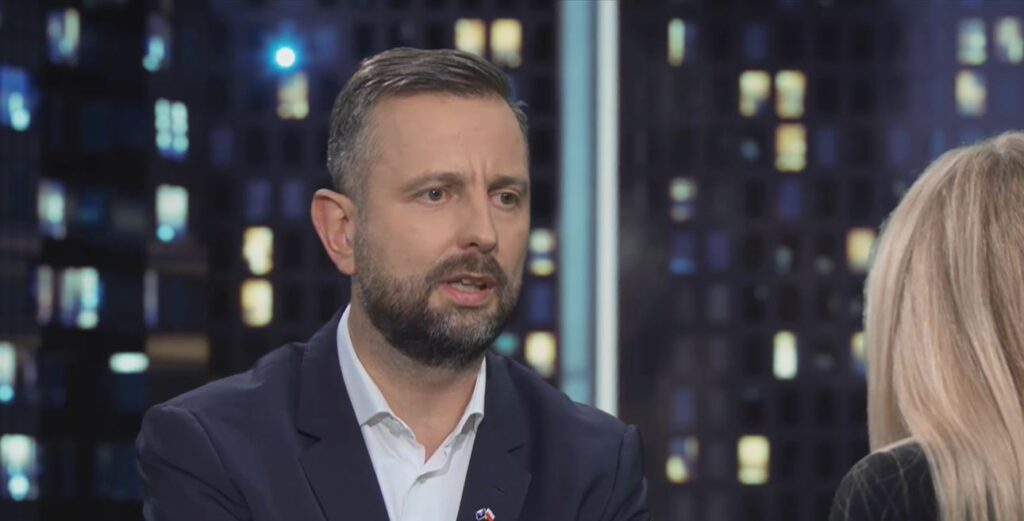

Russian drones breached Polish airspace on the night of 10 September 2025, prompting a rapid NATO response. Sweden will urgently send air defense systems and fighter jets to Poland, confirmed Defense Minister Władysław Kosiniak-Kamysz in a live appearance on TVN24.
“This day is not just about words of support, but also concrete declarations,” Kosiniak-Kamysz said on TVN24. “I just received information from Sweden’s Minister of Defense about the urgent delivery of additional support to Poland—air defense systems and aircraft.”
He stressed that allied decisions are now backed by action.
“Every such escalation makes us more united, not divided,” he said.
According to the minister, Sweden’s military aid will arrive alongside multi-level commitments from other NATO allies, delivered “within dozens of hours.”
Debris from the drones was recovered, but identifying the models remains difficult.
“They often broke into very small pieces,” Kosiniak-Kamysz stated.
He linked the incident directly to Russia’s broader ambitions.
“Russia’s strategy never changes,” he said. “They may change slogans or shapes, but they always move in one direction: destroying the civilization of the West, destroying our culture, our values, and the civilization of life.”
Support from NATO countries has been swift and tangible. The Netherlands will deliver Patriot batteries, NASAMS systems, anti-drone equipment, and 300 soldiers. Other allies—including the Czech Republic, France, the United Kingdom, Germany, Finland, Italy, and the Baltic states—have made clear commitments.
“All our allies are ready to provide support,” Kosiniak-Kamysz said. “They are making concrete declarations.”
Poland triggered consultations under Article 4 of the NATO Treaty—an uncommon move, but one the minister called “a rare and serious situation.” He referenced the 2003 NATO mission near Türkiye’s border with Iraq as a precedent for this type of coordinated defense initiative.
When asked why this particular night saw intensified Russian drone activity, Kosiniak-Kamysz pointed to the timing.
“The correlation with the Zapad exercises is evident,” he said.
Zapad 2025, the latest joint Russian-Belarusian military drills, officially begin on 12 September. Poland has already announced it will shut its border with Belarus starting midnight that day, citing security risks tied to the exercise.


© Uli Deck/DPA, via Associated Press


© Andy Haslam for The New York Times


© Australian Defence Force
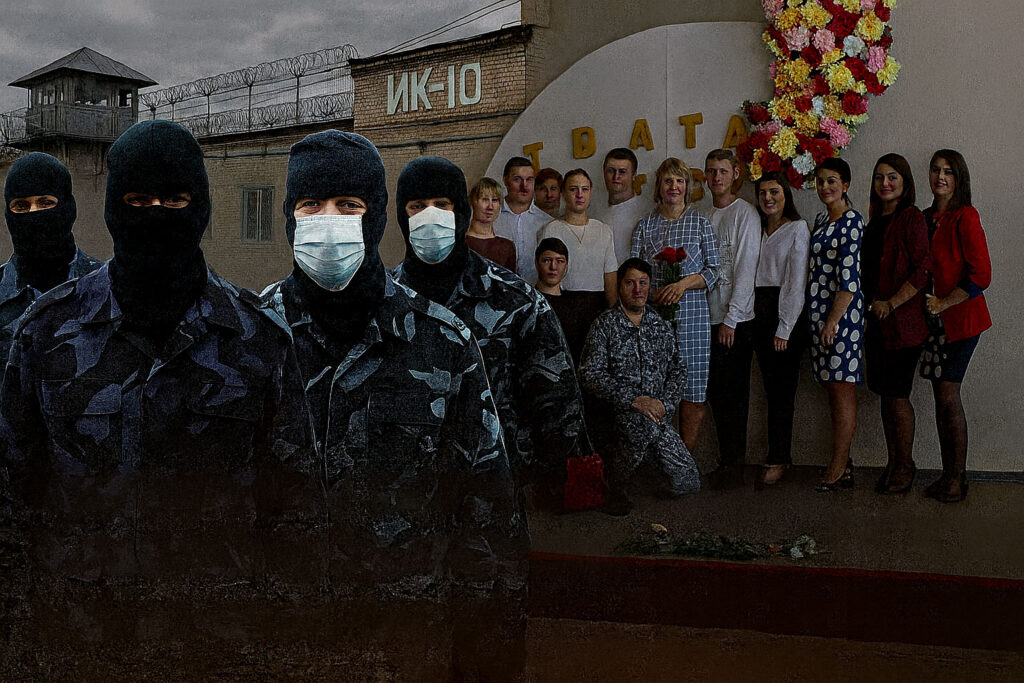

On 4 September, InformNapalm, a volunteer intelligence initiative focused on Russian aggression in Ukraine, published the personal data of 33 Russian prison staff reportedly involved in the torture of Ukrainian POWs at Mordovia’s IK-10. The exposé builds on survivor testimony broadcast by RFE/RL’s Skhemy.
According to InformNapalm, IK-10 has become a conveyor of abuse and repression since the start of Russia’s full-scale invasion. The Mordovia-based colony reportedly held about 700 Ukrainian POWs as of April 2025. Just 177 have been released.
“The rest remain in captivity, continuing to fight not only for freedom but for their lives,” InformNapalm wrote.
A volunteer intelligence group investigating Russian war crimes has publicly identified 33 staff members of Russia’s notorious penal colony No. 10 (IK-10) in Mordovia. InformNapalm, which since 2014 has gathered open-source intelligence to expose war-related abuses, released names, ranks, addresses, contact information, social media profiles, and roles of individuals allegedly responsible for the torture and inhumane treatment of Ukrainian prisoners of war.
The release follows a 17 July 2025 investigation by the Ukrainian news program Skhemy (“Schemes”), a project of Radio Svoboda, which aired testimony from survivors held at IK-10.
Located in the settlement of Udarnyi, Zubovo-Polyansky district, IK-10 is operated as a special-regime facility. InformNapalm and “Schemes” both describe an atmosphere of total psychological suppression, where prisoners were routinely denied medical care, beaten, forced to stand for hours, and cut off from any knowledge of their whereabouts.
Guards and staff reportedly concealed their identities behind balaclavas and medical masks. Even the place of the facility was hidden from detainees. The goal, according to survivor accounts, was to strip POWs of identity and autonomy, reducing them to a state of helplessness under constant threat.
Reports of abuse at IK-10 go back to 2012–2014, but the colony’s role expanded after Russia’s full-scale invasion in February 2022.

The list published by InformNapalm identifies a wide range of staff. At the top is Sergei Zabaiykin, who served as head of IK-10 from 2022 until March 2024 and is now deputy head of the FSIN directorate in Mordovia. FSIN is Russia’s federal authority for the prisons and detention of suspects and convicts. Inform Napalm cites a Russian publication describing Zabaikin as “a thieving head of the colony with a ‘beastly’ attitude toward inmates.”
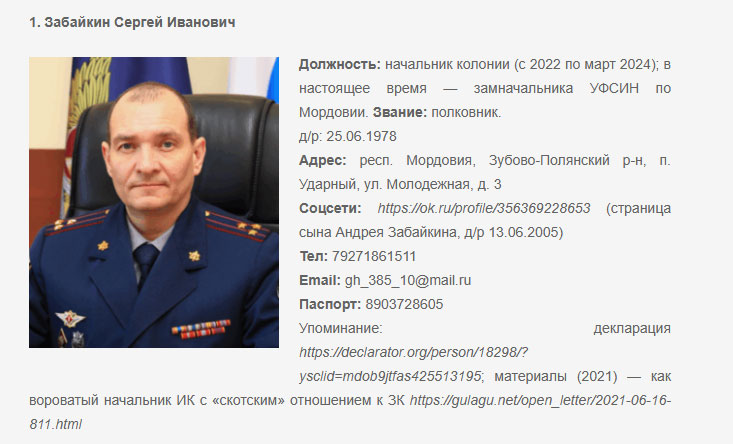
His successor, Aleksandr Gnutov, served as deputy chief, then acting chief, and became official colony head in July 2024.
Other high-ranking figures named include multiple deputy heads: Aleksandr Pavlushkin, Aleksei Anashkin, Yegor Averkin, and Sergei Muymarov. InformNapalm says these individuals oversaw the daily operations during the peak periods of reported violence.
Medical personnel also figure prominently in the report. Field medic Ilya Sorokin—known by the nickname “Doctor Evil”—was named as a central figure. “Schemes” reported that Sorokin left his post at the end of 2024 and joined the Russian Defense Ministry, now operating under the call sign “Doctor” in military supply units. InformNapalm says he remains in contact with his former colleagues and continues to receive medical supplies for use in Russia’s war effort.
Chief physician Galina Mokshanova, her deputy Aleksandr Levin, and multiple other medics and nurses are named as having supported or enabled torture through medical neglect or complicity.
InformNapalm’s list includes more than command and medical staff. It also names psychologists, engineers, and guards believed to have played roles in the abuse. Senior psychologist Alesia Avdonina, for example, is described as a captain of internal service and also a part-time nail technician, showing the stark dissonance between professional responsibilities and daily online life.
Others identified include engineer Konstantin Anchin, psychologist Olga Khremkina, and senior inspector Anna Shcherbakova. InformNapalm notes that several individuals had no social media presence, while others shared openly under their real names.
Following the initial broadcast of “Schemes” in July, InformNapalm says insider sources reported increased activity from the Russian Investigative Committee and FSB. These agencies allegedly warned IK-10 staff about harsher penalties for information leaks and tried to prevent future exposures.
InformNapalm interprets this response as a sign that Russian authorities fear accountability. The group emphasized that “no mask will protect you” and called the release a first step toward identifying all individuals involved in war crimes inside Russia’s penitentiary system.
InformNapalm stresses that the publication of these 33 names is not the conclusion, but the beginning. The group is now encouraging anyone with further knowledge—especially former inmates or staff—to come forward with verified information.
The group seeks specific details: names or nicknames, job roles, periods of employment, specific incidents of abuse, supporting media, and contact information. All information will be carefully verified and sources anonymized when necessary.
InformNapalm warns against directly contacting any of the named individuals and urges caution for those living in temporarily occupied territories. Safe devices, VPNs, and page archiving are strongly recommended when submitting tips.
“This publication is not the final point,” the report concludes. “It’s the foundation for further documentation. Every confirmation is a contribution to truth and justice.”


© David Guttenfelder/The New York Times


As European leaders prepare for a summit on 4 September in Paris, their approaches to security guarantees for postwar Ukraine remain divided into three distinct groups, the Financial Times reports. While a small group of countries, including the UK, are ready to deploy troops, Italy has ruled out participation entirely, and a larger group—among them Germany—have yet to make any firm commitments.
The planned multinational force for Ukraine is at the center of ongoing negotiations over long-term security guarantees. The initiative is being pushed by France and the UK, with the US offering limited but targeted support. According to FT, European capitals are under increasing pressure to clarify what each country is willing to contribute.
French President Emmanuel Macron will host the summit, with some leaders joining in person and others remotely. The talks follow a preparatory meeting on 3 September involving defense officials. UK Defense Secretary John Healey co-chaired the call, where he stated that Britain was “reviewing readiness levels of UK Armed Forces and accelerating funding to be ready for any deployment to Ukraine,” according to the UK Ministry of Defense.
An official from the Élysée Palace told FT that technical preparations for the coalition’s contribution had been completed by those countries “willing and able” to offer security guarantees. “Today we have enough contributions to be able to tell the Americans that we are ready to assume our responsibilities, provided that they assume theirs,” the official said.
US President Donald Trump has told European leaders that Washington would offer intelligence, command and control systems, and help in establishing an air defense shield, but insisted that the European side must lead the effort.
NATO Secretary-General Mark Rutte said on 3 September that he expected “concrete proposals” to be delivered either that day or soon after. He added that further steps would include intensified coordination with the US regarding its participation in the broader effort.
Germany’s position remains unclear. Officials in Berlin reportedly reacted negatively to European Commission President Ursula von der Leyen’s comments to FT that member states were working on “pretty precise plans” for potential deployments to Ukraine, including a “clear road map.”
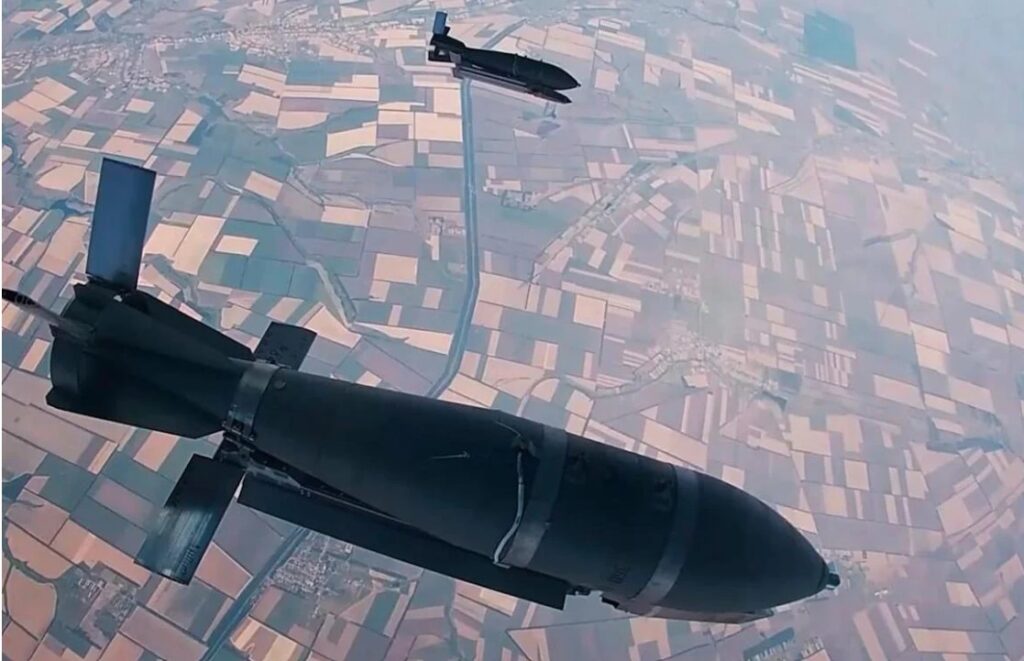

Analysts at Defense Express have spotted a MiG-29 fighter jet armed with a domestic analogue of the Russian UMPK kit, a guided bomb, or a so-called KAB. This indicates the start of wider adaptation of this weapon on a more mass-produced aircraft.
The UMPK kit turns a standard unguided bomb into a precision-guided munition with an extended range.
“The enemy drops 120–150 aerial bombs daily. We, at best, have up to 10 per day. And we need to reach at least 100 per day. Once we finally get enough aerial bombs, the situation at the front can change drastically,” revealed military expert Pavlo Narozhny on Radio NV.
He emphasized that the Ukrainian development does not compete with the French high-precision HAMMERs, which are much more advanced and have a range of over 200 km. Instead, the Ukrainian KABs can be compared to American JDAMs or GBUs, which glide under the influence of gravity.
According to Narozhny, the cost of one Ukrainian KAB could be $25,000. An American JDAM costs around $20,000–22,000.
“We have huge stockpiles of these aerial bombs – high-explosive, cluster, various types. We can use them in massive quantities,” the expert explained.
He also noted that installing a jet engine is a completely realistic next step. This would make the Ukrainian munition technologically closer to Western models and provide additional range.


© Kenny Holston/The New York Times
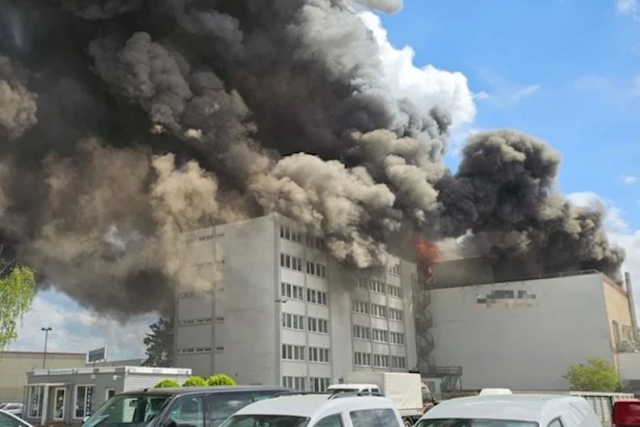

Germany’s Federal Criminal Police Office and intelligence agencies have issued a warning: Russia is attempting to recruit citizens via social media for espionage and sabotage. These so-called “single-use agents” are lured into committing crimes on behalf of foreign intelligence services.
German Chancellor Friedrich Merz has called Russian President Vladimir Putin “perhaps the most serious war criminal of our time.” Meanwhile, NATO Secretary General Mark Rutte has warned that geographical distance provides no security guarantee for Europe against Russian threats, citing missile technology that can reach European capitals within minutes.
According to German intelligence, malicious actors initiate casual conversations on social networks, assess the user’s political stance, and later offer money for criminal acts — such as property damage.
“Anyone who agrees becomes an ‘agent’ of another state… Behind these recruitment attempts may stand foreign intelligence services. Their goal is to destabilize Germany using people within the country,” the agencies cautioned.
Authorities stress that Russian intelligence is particularly interested in military bases and sites where Ukrainian soldiers are being trained.
“Perpetrators hope to gain strategic advantages by spying on such facilities or disrupting their operations… Successful sabotage could severely damage military structures and undermine trust in the state,” the statement reads.
This represents a classic case of hybrid warfare, where an enemy seeks to weaken its opponent without direct confrontation.
German citizens are urged not to fall for such recruitment attempts and to remember the consequences. “Anti-constitutional sabotage” in Germany carries a penalty of up to five years in prison, while “espionage activities” can result in up to ten years.
If crimes are proven to be carried out in the interests of a foreign intelligence service, the punishment is even harsher.


© Roderick Aichinger for The New York Times


In a report on 31 August, the Institute for the Study of War (ISW) outlined how the Kremlin has intensified its multi-pronged information campaign to weaken Western support for Ukraine and derail the European role in peace efforts in the ongoing Russo-Ukrainian war.
Russia is now aggressively pushing three narrative lines at once: blaming European states for prolonging the war, reviving nuclear threats, and portraying Russian victory as inevitable.
Kremlin officials have returned to a long-standing propaganda line that paints European states as obstacles to peace in Ukraine. ISW noted that Kremlin spokesperson Dmitry Peskov and Russian Direct Investment Fund (RDIF) CEO Kirill Dmitriev recently implied that European countries are deliberately extending the conflict. According to ISW, Russia is using Dmitriev—who frequently represents Kremlin interests on Western platforms—to reintroduce this message into the Western media environment, aiming to erode US confidence in European allies.
On 31 August, Russian Security Council Chairperson Dmitry Medvedev launched a pointed attack against French President Emmanuel Macron and German Chancellor Friedrich Merz. Posting on his English-language X account, Medvedev accused the two leaders of having “forgotten the lessons” of World War II. He warned that “things could end up like they did in 1945 – [Macron and Merz] too may end up being identified by their teeth,” directly invoking the atomic bombings of Hiroshima and Nagasaki. Medvedev also described recent Russian military progress as “bad news” for the European leaders.
ISW assessed that this language is intended to threaten France and Germany with nuclear consequences for their involvement in US-led efforts to end the war, while simultaneously amplifying the idea of unstoppable Russian military momentum.
Alongside these threats, the Kremlin continues to push the idea that Russian victory in Ukraine is certain. ISW reported that the Russian Ministry of Defense has ramped up its efforts to project battlefield success using large volumes of qualitative data. However, ISW assessed that these claims are inflated and part of the broader strategy to demoralize Ukraine’s allies and reduce Western resolve.
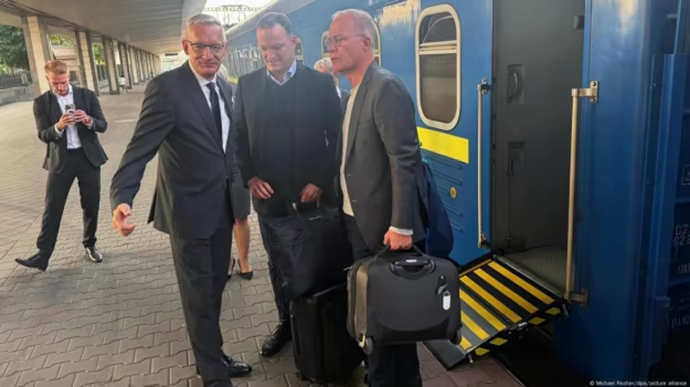

Jens Spahn from the CDU/CSU and Matthias Miersch from the Social Democratic Party of Germany (SPD) arrived in Kyiv on 1 September, DW reported.
The visit marks the first joint trip to Ukraine by the parliamentary group leaders of the CDU/CSU and SPD. Both Spahn and Miersch are making their inaugural visits to Ukraine.
The German politicians plan to discuss continued German support for Ukraine and diplomatic efforts to end the war during their stay in Kyiv, according to the report.
“Matthias Miersch and I are here to send a clear signal: the government factions CDU/CSS and SPD stand now and in the future on the side of Ukraine, the brave Ukrainians who defend their homeland, their country, and also Europe,” Spahn said.
When asked about possible security guarantees for Ukraine, Spahn emphasized that the best guarantee is a well-equipped Ukrainian army. “The first and most important security guarantee for Ukraine is the Ukrainian army. Above all, we want to equip it as well as possible,” he said.
The visit follows German Vice Chancellor Lars Klingbeil’s trip to Kyiv on 25 August. During that visit, Klingbeil announced Germany’s commitment to provide Ukraine with nine billion euros annually over the coming years.
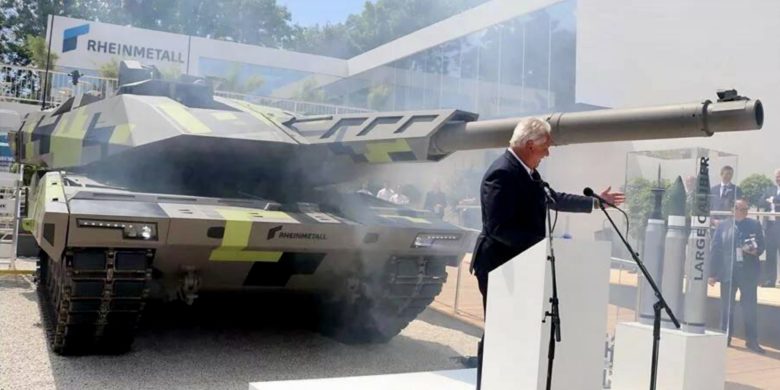

Armin Papperger, head of German defense conglomerate Rheinmetall, said Ukraine will soon receive its first ammunition from a new plant in Unterlüß, Lower Saxony, Deutsche Welle reports.
This year, 25,000 shells will be sent to Ukraine. The factory could produce 150,000 or more next year.
“We will increase production to 350,000 for Germany and Ukraine. Next year, we can deliver at least 100,000, and later possibly 200,000 shells to Ukraine,” Papperger noted.
Rheinmetall is building a similar factory in Ukraine, but bureaucracy is slowing the process.
“I discussed this with Defense Minister Denys Shmyhal. I told him: it can be done in 14 months. Currently, the civilian part isn’t ready; a concept is needed,” the CEO explained.
He added that the plant could be ready in 12–14 months if organizational issues are resolved.
The company also plans to invest in drone production — not small quadcopters, but larger, high-tech systems.
“If there are opportunities — we will do it,” Papperger added.


Germany is reconsidering its position on sending troops to enforce ceasefire efforts in Ukraine, a shift from its stance two weeks ago, Bild reports.
Following talks at the Alaska summit, Germany signaled readiness to send troops to Ukraine as part of a potential peacekeeping mission should the war be frozen.
However, with the realization that Russia is unlikely to agree to ceasefire proposals, German officials are now prioritizing financial support to strengthen Ukraine’s defense, according to Bild.
Both Chancellor Friedrich Merz and Vice Chancellor Lars Klingbeil have expressed skepticism about peace talks between Russia and Ukraine, citing Russian President Vladimir Putin’s lack of interest in negotiations.
Financial support as a form of “security guarantee” allows Germany to bolster Ukraine’s defense capabilities without direct military involvement.
“Even if the guns fall silent and there is an agreement between Russia and Ukraine, the German government wants to secure the security guarantee primarily with money,” Bild reports, citing government sources.
Bild reports that Germany may cover part of Ukrainian soldiers’ salaries, while continuing training and supporting expanded weapons production with German defense firms.
Deploying German soldiers to monitor a ceasefire is “off the table for now,” with changes only possible if Trump acts and Russia ends the war, which “shows no signs” of happening, government sources said.
The concept of security guarantees for Ukraine has been a central topic in international discussions in recent weeks.
Ukrainian President Volodymyr Zelenskyy has outlined a three-pillar framework, focusing on sustained military support, NATO-level backing, and continued sanctions against Russia as key elements of any post-war arrangement.
However, Russia has broadly rejected Western proposals, calling them attempts to turn Ukraine into a “strategic provocateur” on its borders. This refusal complicates any potential implementation of security guarantees.
Discussions in the West, including considerations of additional support mechanisms such as private military contractors, continue as countries seek ways to bolster Ukraine’s defense while avoiding direct military escalation.
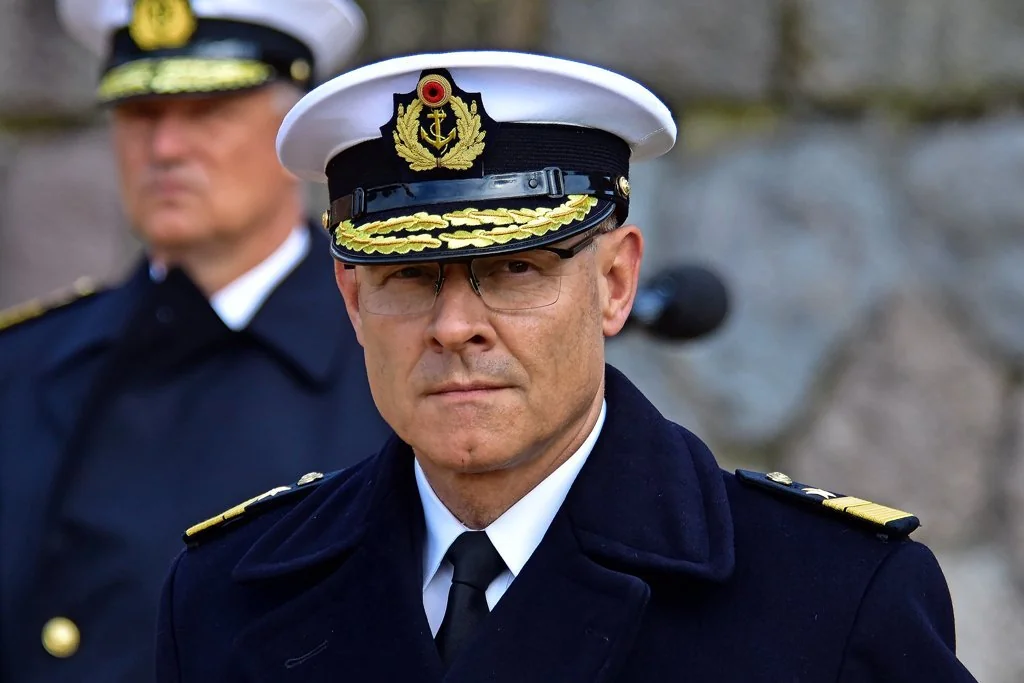

Vice Admiral Jan Christian Kaack, Inspector of the German Navy, has warned of “increased aggressiveness” from Russian units and their potential consequences, according to Spiegel as reported by Evropeyska Pravda.
“There are drone overflights, we have infiltration attempts, sabotage attempts,” Kaack said, Deutschlandfunk reported on 30 August. He added that Bundeswehr soldiers are being specifically contacted outside of duty hours, alongside threats to maritime infrastructure.
The warning comes after The New York Times reported that Russia or Russian supporters are using reconnaissance drones to monitor routes in eastern Germany used by the US and allies to transport military cargo to Ukraine, citing sources from US agencies and other Western states.
Kaack emphasized the risk of unintended escalation. “All this also carries the danger that there could be an escalation by accident,” he said. The navy has significantly strengthened its security measures in response, with precise rules of engagement designed to prevent such scenarios.
“We are working to better protect these bases in the air, underwater and above water, including with our own drone systems,” the inspector stated. Reports about increased flights of Russian spy drones serve as “a small wake-up call that we need to do more,” according to Kaack.
“The services assume that by 2029 at the latest, a potential adversary would be ready to cause trouble,” the Vice Admiral said, referring to intelligence findings. “And we want to prevent that by being defense-ready and capable of deterrence.” This applies to the Baltic Sea region as well.
In recent months, underwater cables have been repeatedly damaged by ships dragging anchors across the seabed. Ships from Russia’s so-called shadow fleet are primarily blamed for such incidents, though Chinese vessels have also faced accusations.
The German military has documented escalating drone activity throughout 2024. In February, German forces detected suspicious drones over a base where Ukrainian soldiers were training and investigated possible espionage. In May, unofficial reports indicated unknown drones circled near a German police patrol vessel in the North Sea that was monitoring a Russian cargo ship.
By early July, German government agencies finally began acquiring countermeasures against unknown drones occasionally spotted near sensitive facilities. In early August, reports indicated that 536 drones were detected over important facilities in Germany between January and March of this year.
Kaack praised the planned military service model approved by the cabinet on Wednesday. He expressed confidence that the planned voluntary military service solution would massively help the navy address its recruitment problems. “The new military service will be the game-changer,” Kaack said.
The inspector acknowledged being “always a friend of military conscription” but noted that the time since conscription was suspended in 2011 cannot be undone. The Bundeswehr will need time to restore capabilities abandoned at that time. The goal is to develop into a training navy that massively and regularly inspires large numbers of young people to commit for longer periods. “And that also takes time,” he said.
The German Navy is also investing in new equipment for enhanced security. The first Boeing Poseidon P-8 reconnaissance aircraft is scheduled for delivery in September, Kaack announced. Eight aircraft of this type have been ordered so far, with four additional orders under discussion. The navy will also soon have an underwater drone at its disposal.
However, Kaack warned that complete protection would never be possible.


German Chancellor Friedrich Merz warns that Russia’s war against Ukraine could continue for “many months” as Vladimir Putin refuses to engage in negotiations, Guardian reported on 29 August.
Merz made these comments during a meeting with French President Emmanuel Macron, questioning Putin’s commitment to peace talks. The German chancellor said that initial discussions centered on organizing a bilateral summit between Putin and Ukrainian President Volodymyr Zelenskyy within two weeks, but the Russian leader “clearly unwilling” to proceed with this timeline.
“Frankly, this doesn’t surprise me, because it’s part of the Russian president’s strategy to proceed in the same way,” Merz said.
The chancellor emphasized the need for coordinated action within what he termed the “Coalition of the Willing” to increase pressure on Russia and force Moscow to return to the negotiating table.
Merz’s assessment builds on his recent statements regarding Russian tactics. On 26 August, he suggested that Moscow was deliberately stalling by linking any potential Putin-Zelenskyy meeting to specific conditions. The following day, the German chancellor argued that Ukrainian capitulation would only provide Putin time to prepare for future conflicts.
The comments reflect growing European concern about the prolonged nature of the war and questions about Russian willingness to engage in meaningful diplomatic efforts.


© Natalie Keyssar for The New York Times


© Natalie Keyssar for The New York Times
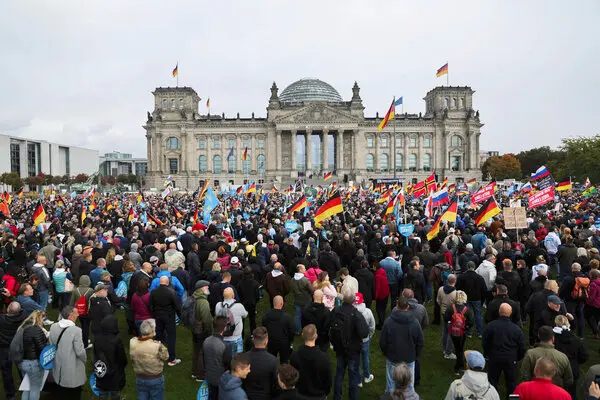

A majority of Germans now support Ukrainian territorial concessions to Russia in exchange for peace, according to a new poll, as diplomatic efforts continue amid ongoing military tensions.
The Forsa polling institute found that 52% of respondents believe “Ukraine should be ready to cede occupied territories to Russia if necessary to enable a peace agreement,” according to RTL/ntv-Trendbarometer data collected on 18-19 August from 1,002 respondents.
Support for territorial concessions varies significantly by political affiliation, according to the report. Among supporters of the far-right Alternative for Germany (AfD) party, 72% endorsed the idea. Conservative CDU/CSU supporters showed less enthusiasm at 43%, while Social Democrats registered 48% support.
The polling results emerge as diplomatic initiatives intensify. Ukrainian President Volodymyr Zelenskyy identified potential meeting locations for negotiations with Russia, mentioning Türkiye, Gulf states, and several European countries as possible venues for peace talks.
“From our side, everything will be maximally ready to end this war,” Zelenskyy said in his evening video address on 26 August, while emphasizing the need to maintain pressure on Moscow “to rid the Kremlin of delay tactics.”
Meanwhile, tensions between Washington and Moscow continue. US President Donald Trump criticized Russia following the latest attacks on Ukrainian infrastructure, dismissing Moscow’s challenges to Zelenskyy’s legitimacy as posturing.
German Chancellor Friedrich Merz accused Putin of employing “delay strategies” regarding peace efforts. Putin considers it appropriate to attach preconditions to a meeting with Zelenskyy that are “completely unacceptable” from Ukraine’s and its Western partners’ perspective, Merz told reporters in Berlin.
The Kremlin echoed these delays, with spokesman Dmitry Peskov emphasizing that any high-level meetings require “good preparation to be effective.” Russian and Ukrainian delegation heads remain in contact, Peskov said, though he could not provide a timeline for potential talks.
On the battlefield, Russian forces continue advancing in eastern Ukraine. Ukrainian military analysts reported Russian troops entered Dnipropetrowsk Oblast, marking territory in Zaporiske and Novoheorhijiwka as occupied. Ukrainian forces disputed complete Russian control, with the “Dnipro” army grouping stating they “stopped the advance of Russian forces and continue to control the village of Zaporiske.”
The conflict’s humanitarian impact persists, with over 100,000 consumers losing power across three Ukrainian regions following Russian attacks on energy facilities, Zelensky reported on social media platform X.
Ukraine has adjusted some wartime restrictions, lifting the exit ban for men aged 18-22. Prime Minister Julia Svyrydenko announced that “men between 18 and 22 can cross the border unhindered during martial law,” citing educational opportunities abroad and maintaining connections with compatriots overseas.
The polling data reflects shifting German public sentiment as the conflict approaches its third anniversary, with economic and diplomatic pressures mounting on all parties involved in the ongoing war.


© Heiko Becker/Reuters


© Mindaugas Kulbis/Associated Press


Germany has committed to providing €9 billion ($10 bn) in annual support to Ukraine over the coming years, German Finance Minister and Vice-Chancellor Lars Klingbeil announced during a meeting with Ukraine’s president.
“As finance minister, I emphasized, and this was also agreed by the Federal Government, that we commit to supporting Ukraine in the coming years, spending 9 billion euros annually,” Klingbeil said.
The German finance minister held separate discussions with his Ukrainian counterpart Serhiy Marchenko to address Ukraine’s financial resource requirements for 2026.
Marchenko revealed that Germany’s direct budget assistance to Ukraine has reached €1.6 billion ($1.9 bn) since early 2022. The Ukrainian minister highlighted additional German contributions through European Union mechanisms.
“Also significant is the support by the German government of the EU’s Ukraine Facility instrument, within which €22.6 billion ($26.2 bn) has already been attracted to the state budget, and the ERA mechanism — we received €9 billion ($10 bn) from the EU,” Marchenko wrote.
Germany’s financial commitment extends beyond budget support to military assistance. The country previously announced it would finance a $500 million package of military equipment and ammunition from the United States for Ukraine. Additionally, Germany and Norway will jointly fund two Patriot air defense systems for Ukraine.
The €9 billion ($10 bn) annual pledge represents a substantial increase from current direct budget assistance levels, signaling Germany’s long-term commitment to supporting Ukraine’s financial stability.
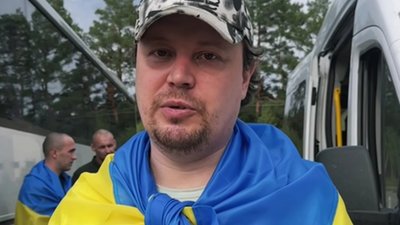

A Ukrainian political prisoner burst into tears after his return home after seven years in a Russian colony. Kostiantyn Davidenko finally set foot on Ukrainian soil on 24 August as part of the 68th prisoner exchange.
Serving such a long sentence is remarkable, as many prisoners die in Russian captivity within a year or two due to lack of medical care, torture with electric shocks, and the absence of adequate food.
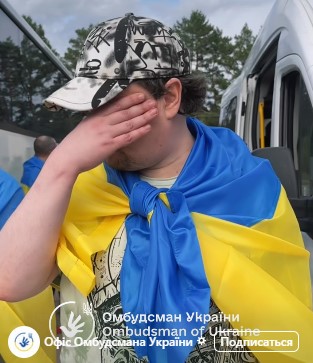
On 11 February 2018, the Russian FSB detained Davidenko in Simferopol. On 6 June 2019, the so-called “Supreme Court” of Crimea sentenced him to 10.5 years in a high-security colony, accusing him of spying for Ukraine, UkrInform reports.
Russian intelligence claimed he was allegedly gathering information on the activities of Russian National Guard units and FSB personnel.
“This is an important signal for others who have lost hope and waited for years — you will come home,” Ihor Kotelyanets, head of the NGO Association of Relatives of Kremlin Political Prisoners, emphasizes.
He adds that hundreds of Ukrainians imprisoned in Russia since 2014 still need to be rescued, including Hennadiy Lymeshko, Halyna Dovhopola, Valentyn Vyhivskyi, Volodymyr Yakymenko, Victor Shur, and the Abdullaiev brothers.
Stepping onto Ukrainian soil, Davidenko said, “Ukraine is bringing its people home. But many others, imprisoned in Russia since 2014, 2015, or 2016, are still there. They need to be here.”
This exchange is further proof that Ukraine is systematically working to return its citizens from captivity, including those unlawfully imprisoned before the all-out war.


© Sean Gallup/Getty Images
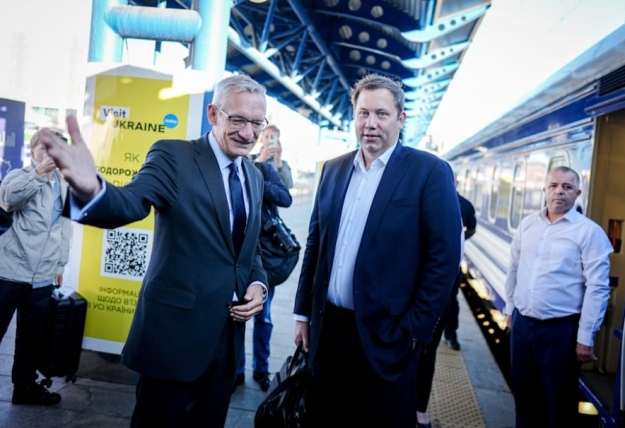

German Finance Minister and Vice Chancellor Lars Klingbeil arrived in Ukraine’s capital on 25 August for an unannounced visit, delivering a direct message to Russian President Vladimir Putin about Germany’s unwavering support for Ukraine.
“Putin should have no illusions that Germany’s support for Ukraine could crumble,” Klingbeil said upon his arrival in Kyiv, according to Reuters. “On the contrary: We remain Ukraine’s second-largest supporter worldwide and the largest in Europe.”
The Social Democratic Party leader, whose party serves as the junior partner in Chancellor Friedrich Merz’s conservative-led coalition government, emphasized Germany’s commitment to Ukraine. “Ukraine can continue to rely on Germany,” Klingbeil stated.
Germany has provided 50.5 billion euros ($59.18 billion) in support to Ukraine since Russia’s invasion began in February 2022, according to Klingbeil’s ministry.
The visit comes as international discussions intensify around potential peace negotiations for what Klingbeil described as “Europe’s deadliest war in 80 years.” Klingbeil called on Putin to demonstrate interest in a peace process but outlined specific conditions for any settlement.
“Ukraine needed to be involved in the talks and there needed to be a ceasefire and reliable security guarantees for a lasting peace,” Klingbeil said. “To this end, we are coordinating closely internationally.”
The German official’s visit coincides with growing international debate over security arrangements for Ukraine following any potential peace deal. French President Emmanuel Macron and British Prime Minister Keir Starmer have both supported troop deployments as part of a coalition framework, while Chancellor Merz has signaled openness to German participation despite anticipated political opposition.
President Donald Trump’s pressure for a quick resolution to the conflict has raised concerns in Kyiv and among its allies about potential forced agreements favoring Russian terms, Reuters reports.
The unannounced nature of Klingbeil’s visit underscores Germany’s diplomatic engagement at a critical juncture in the war.
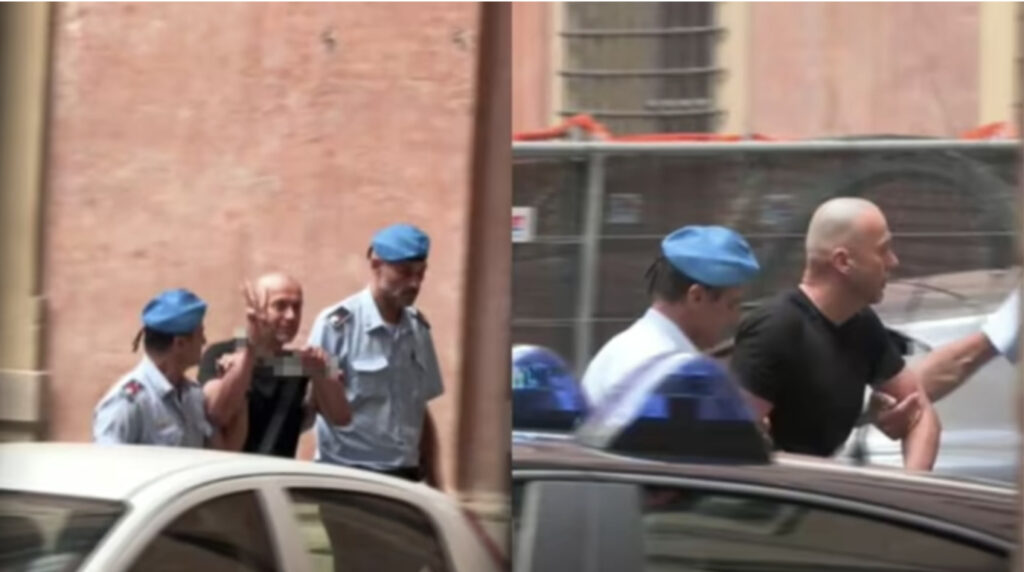

New details have emerged about the technical execution of the September 2022 Nord Stream pipeline attacks, with German investigators revealing that at least four explosive devices weighing 14 to 27 kilograms each were used to destroy the pipelines at depths of 70-80 meters in the Baltic Sea.
The explosive devices consisted of a mixture of RDX and HMX and were equipped with delayed-action detonators, according to the arrest warrant for Ukrainian suspect Serhii Kuznetsov obtained by Tagesschau.
German investigators believe the operation involved a six-person team comprising a skipper, four divers, and an explosives expert who coordinated the placement of the bombs on both Nord Stream 1 and Nord Stream 2 pipelines.
Serhii Kuznetsov allegedly coordinated the entire mission. The 49-year-old Ukrainian—a former Security Service employee and retired Armed Forces captain—was arrested on 20 August at an Italian beach resort near Rimini where he was vacationing with his family.
When Italian police brought him to court in Bologna, handcuffed and flanked by three officers, Kuznetsov made a defiant gesture to waiting journalists. Three fingers. Ukraine’s trident symbol.
Kuznetsov boarded the rented sailing yacht “Andromeda” from Wiek on Germany’s Rügen island, coordinated the team as they planted bombs on both Nord Stream 1 and 2 pipelines, then departed on September 22. A driver picked him up and took him back to Ukraine. The remaining team members returned to Hohe Düne near Warnemünde—where they’d originally rented the boat.
How did German investigators crack the case? The investigation began in October 2022, with German Federal Criminal Police and Federal Police conducting underwater examinations using diving robots, collecting soil samples, and recovering pipeline fragments.
A breakthrough came through intelligence from a foreign service that led investigators to the “Andromeda” yacht, which had been rented in Mecklenburg-Western Pomerania using false identities through a Polish shell company. When investigators examined it, they found fingerprints, DNA traces, and explosive residue. The evidence trail started there.
Italian media report that Kuznetsov’s lawyer has rejected the charges, and the suspect has refused to consent to extradition to Germany.
This represents the first arrest in what prosecutors call one of Europe’s most spectacular acts of sabotage. But it’s not the first suspect they’ve pursued.
Last year, German authorities tried to arrest another Ukrainian, Volodymyr Z., in Poland, who was allegedly involved as a diver in the operation. Despite having a European arrest warrant, he escaped—reportedly leaving in a Ukrainian diplomatic vehicle before Polish police could detain him.
According to Wall Street Journal reporting from August 2024, the operation was planned by high-ranking Ukrainian military officials and businessmen using a recreational yacht and publicly available nautical charts. According to WSJ sources, President Zelenskyy initially approved the plan but later ordered then-Commander-in-Chief Valerii Zaluzhnyi to halt it after CIA warnings. Zaluzhnyi allegedly ignored the order.
Zelenskyy has consistently denied government involvement in the attacks. But German investigators believe they’ve identified multiple suspects—Ukrainian civilians plus current and former military personnel.
Kuznetsov faces charges of “anti-constitutional sabotage,” “intentional causing of an explosion,” and “destruction of buildings”—potentially 15 years in prison.
An Italian court will decide his fate. The key hearing is scheduled for next week.
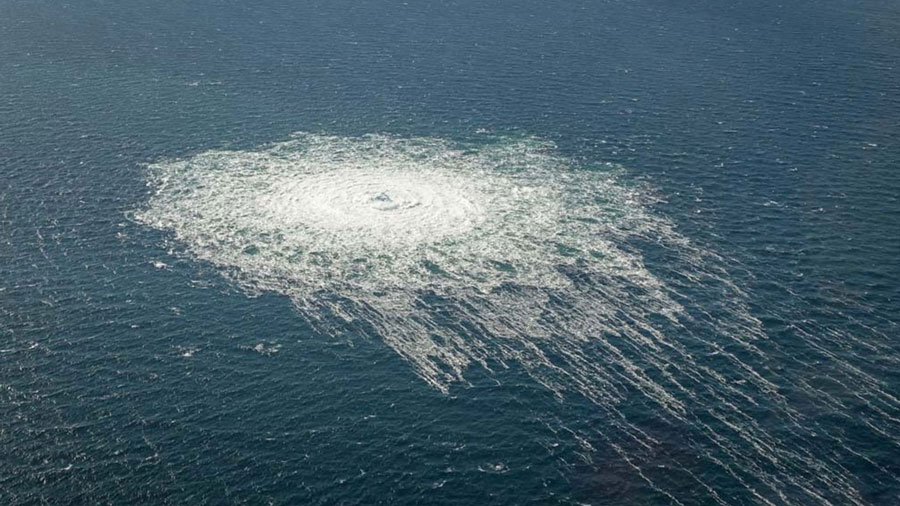

Ukrainian citizen Serhii Kuznetsov denied charges related to the 2022 Nord Stream pipeline explosions during a court hearing in Bologna on Friday and refused consent for extradition to Germany.
“He was in Ukraine at the time of the blasts,” according to Italian news agency ANSA, which reported that Kuznetsov made the statement while displaying a three-finger trident gesture representing Ukrainian national identity.
The 49-year-old suspect was arrested on the evening of 21 August at a farm holiday resort in San Clemente, near Rimini, on a European arrest warrant issued by German federal authorities. He faces charges including joint commission of an explosion using explosives, anti-constitutional sabotage, and destruction of buildings.
Italian police detained Kuznetsov while he was vacationing with his family. German investigators suspect he belonged to a group that destroyed the Nord Stream pipelines in September 2022 but was not among the divers who planted the explosives.
The Bologna court hearing was adjourned until early afternoon after Kuznetsov requested a Ukrainian or Russian interpreter. “The arrested man said he wasn’t fluent in English and requested a Ukrainian or Russian translator,” ANSA reported.
Deputy Prosecutor Licia Scagliarini granted German judicial authorities’ request for the suspect’s surrender, though Kuznetsov told the court he does not consent to being handed over to Germany.
According to German prosecutors, Kuznetsov served a coordinating function aboard the sailing yacht “Andromeda” during the operation. The yacht was allegedly rented through intermediaries from a German company using forged documents.
German media previously identified Kuznetsov as a former Security Service of Ukraine employee and retired captain in the Ukrainian Armed Forces. This marks the second arrest warrant in the case after Ukrainian citizen Volodymyr Z. managed to leave Poland for Ukraine before detention in July.
The Wall Street Journal previously reported that Ukrainian President Volodymyr Zelenskyy initially approved the pipeline operation but later ordered its cancellation after Dutch military intelligence informed the CIA, which then alerted Germany. According to WSJ sources, General Valeriy Zaluzhnyi ignored Zelenskyy’s order to halt the operation.
German investigators have been examining the explosions since 2022, initially suspecting Russian involvement before tracing evidence to Ukraine. Federal Police and Federal Prosecutor investigators eventually traced the sailing yacht and uncovered connections to Ukrainian operatives.
Security circles indicate uncertainty regarding when Kuznetsov will be extradited to Germany, with the validation of his arrest and pre-trial detention request under discussion in Bologna.
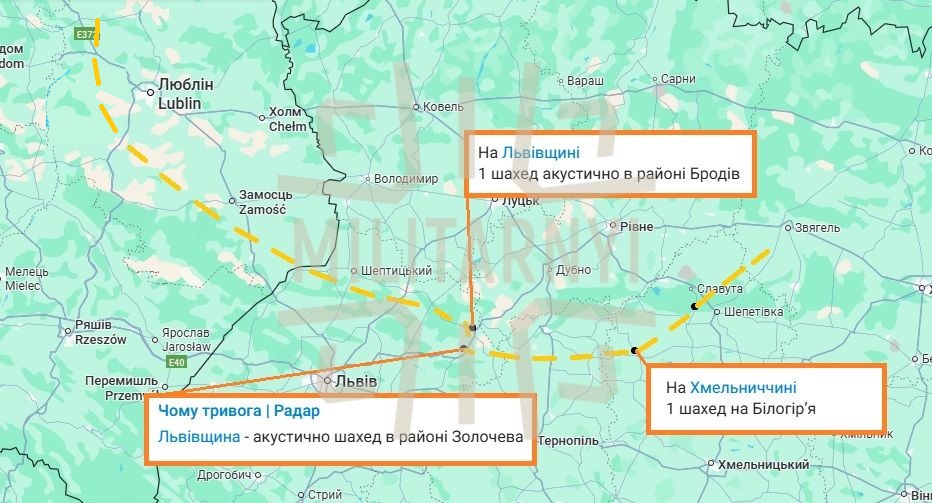

Militarnyi reports that a Russian Shahed long-range explosive drone remained in Polish airspace for approximately two and a half hours before crashing on 20 August. The drone was not shot down and went undetected during its entire flight over Poland.
Russia launches drone and missile attacks against Ukrainian civilians on a daily basis. At times, its explosive drones leave Ukrainian airspace and enter neighboring countries. So far, only Belarus—Russia’s ally—has attempted to shoot down these drones. In all other documented cases, including incursions into Moldova, Romania, Poland, and Lithuania, no drones have been intercepted.
The incident follows a pattern of Poland scrambling fighter jets during Russian missile and drone strikes on Ukraine. These aircraft usually do not intercept objects unless they allegedly directly threaten NATO territory.
According to analysis by Ukrainian monitoring groups, the Shahed drone flew across Ukraine overnight on 19–20 August, Militarnyi says. Its route reportedly passed through Zhytomyr, Khmelnytskyi, Ternopil, and Lviv oblasts before entering Polish airspace.
The straight-line distance from the Ukrainian border to the crash site in the Polish village of Osiny is around 200 kilometers. Given the average speed of Shahed drones — between 120 and 150 km/h — the flight would have taken approximately 1.5 hours if it followed a direct path.
Air alerts in Ukraine are typically turned off 20–30 minutes after the threat ends, which suggests the drone left Ukrainian airspace around 1:00 Kyiv time. It then remained over Poland for about two to two and a half hours before crashing at 3:22 Kyiv time (2:22 Warsaw time).
Official reports indicate that Polish air surveillance systems did not detect the drone at any point during its flight across Polish territory. The crash occurred in Osiny, located in Lublin Voivodeship. The village lies approximately 100 km from Ukraine, 90 km from Belarus, and only 40 km from Warsaw.
Such drones have jamming-resistant navigation and would typically return to its programmed target even if disrupted by electronic warfare. That means only two scenarios are considered possible: either the drone experienced an internal malfunction, or it was intentionally directed toward Poland. In the case of electronic interference, the onboard autopilot would still attempt to resume the original route and continue toward the programmed destination.
As previously reported, Polish prosecutors confirmed that the wreckage found in Osiny came from a Russian drone. Initially, Poland’s army claimed no airspace violation had occurred, but this was later contradicted by the findings. The drone exploded in a cornfield, damaging a patch of farmland approximately 8–10 meters wide and breaking windows in nearby homes. No injuries were reported.
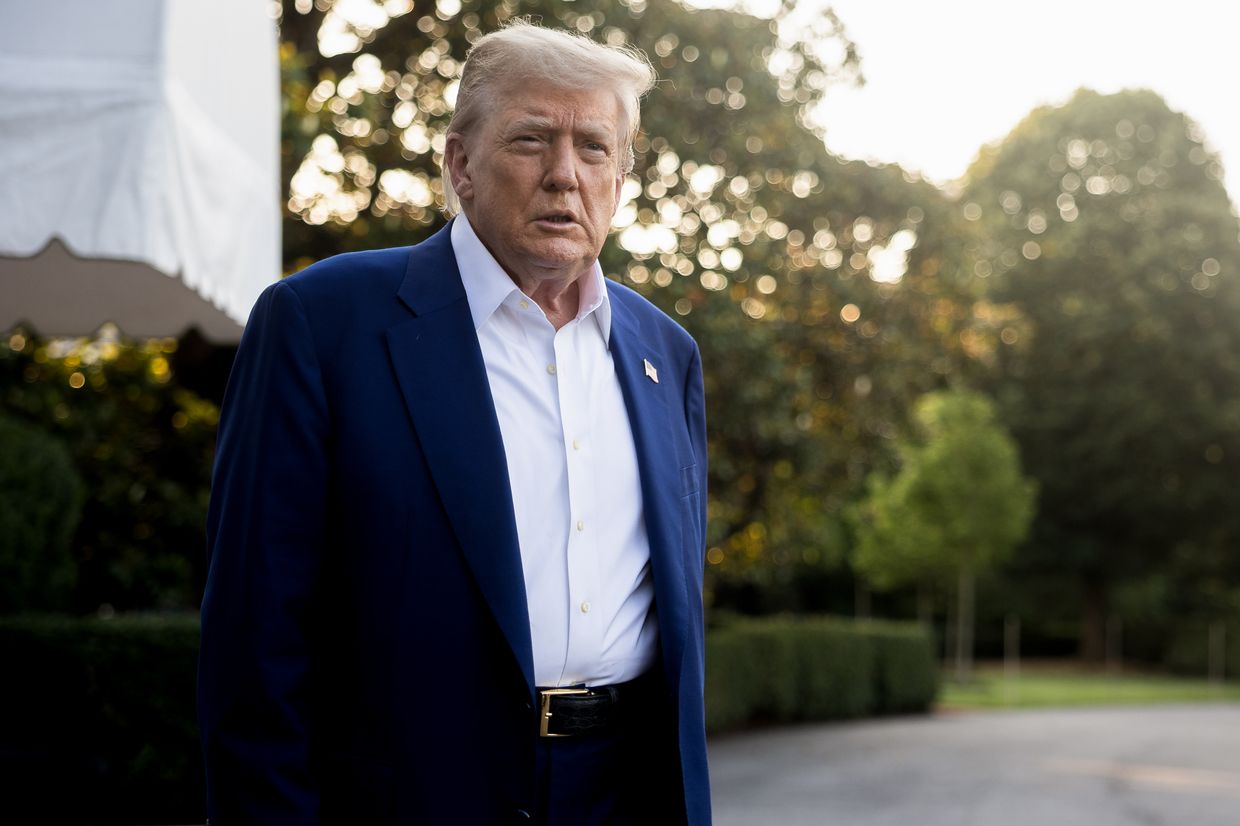

U.S. President Donald Trump has promised to send 10 Patriot interceptors to Ukraine - a smaller number than had been paused previously while en route to the country, Axios reported on July 8, citing its sources.
Trump has also suggested that Germany sell one of its Patriot batteries to Ukraine, according to three sources cited by Axios. They said the U.S. and European allies would split the cost of the purchase.
The discussion comes as Ukraine is calling upon its allies, particularly the United States, to support Ukrainian air defense by supplying "life-saving" Patriot systems and relevant missiles.
The Pentagon said on July 2 that some military assistance to Ukraine had been halted as the U.S. Defense Department conducts a review of foreign aid deliveries.
On July 7, the Pentagon said it would renew shipments, saying the additional defensive weapons were intended to help Ukraine protect itself while the U.S. works toward "a lasting peace."
Merz called Trump to request the release of the paused interceptors, according to Axios. During the call, Trump proposed that Germany sell one of its own Patriot batteries to Ukraine.
While no agreement has been reached, officials on both sides say negotiations are ongoing. German officials maintain that Berlin has already sent a higher share of its available Patriot systems to Ukraine than any other NATO country, including the U.S.
Russia has escalated its aerial campaign against Ukraine in recent weeks, launching large-scale missile and drone attacks that have killed and injured hundreds of civilians across multiple cities.
The suspension of U.S. arms deliveries, which include Patriots and precision-guided munitions, drew criticism from Kyiv. During a July 4 phone call with Ukrainian President Volodymyr Zelensky, Trump said he was not responsible for halting the aid, according to the Wall Street Journal.
He reportedly told Zelensky that a review of U.S. munitions stockpiles was initiated after last month's U.S. strikes on Iranian nuclear sites, but denied ordering a full pause in shipments.
NBC News reported that Defense Secretary Pete Hegseth halted the shipments unilaterally on July 2, despite internal Pentagon assessments that the move would not jeopardize U.S. military readiness.
Special Envoy Keith Kellogg and Ukrainian Defense Minister Rustem Umerov are set to meet in Rome later this week to discuss resuming the stalled military aid, Politico reported on July 7.
 The Kyiv IndependentDr. Gary E Myers
The Kyiv IndependentDr. Gary E Myers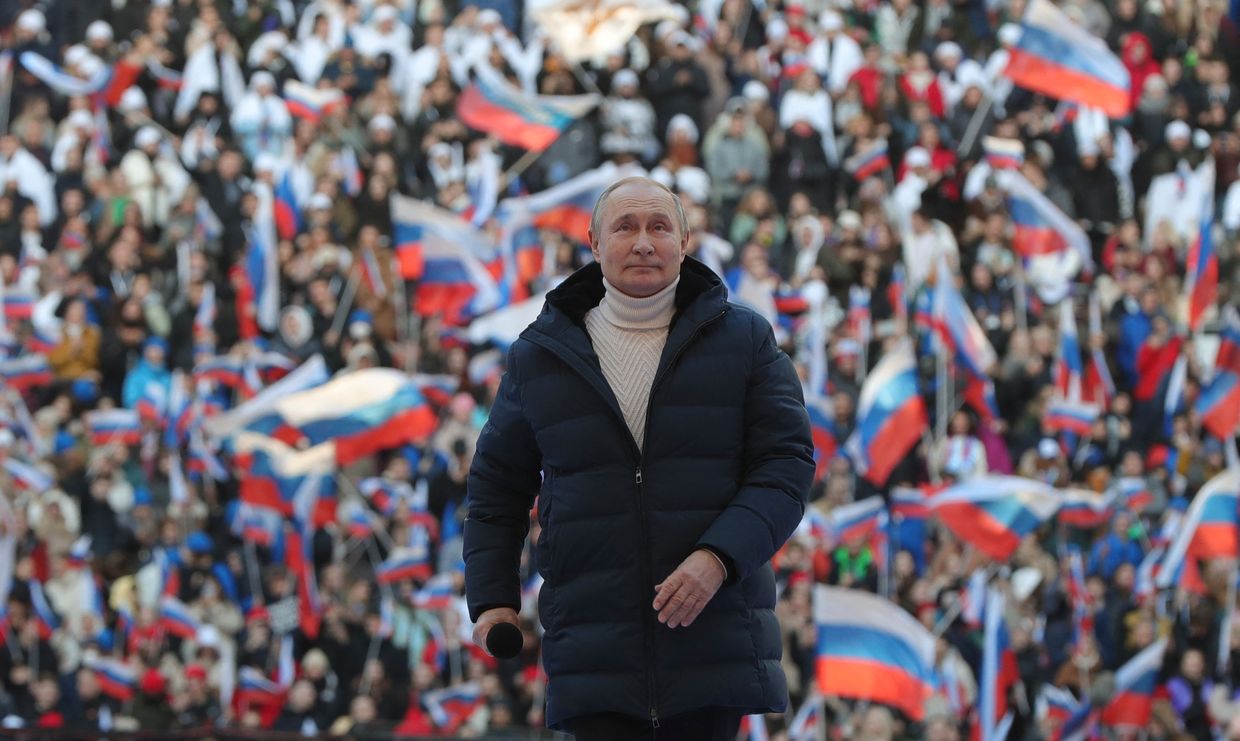
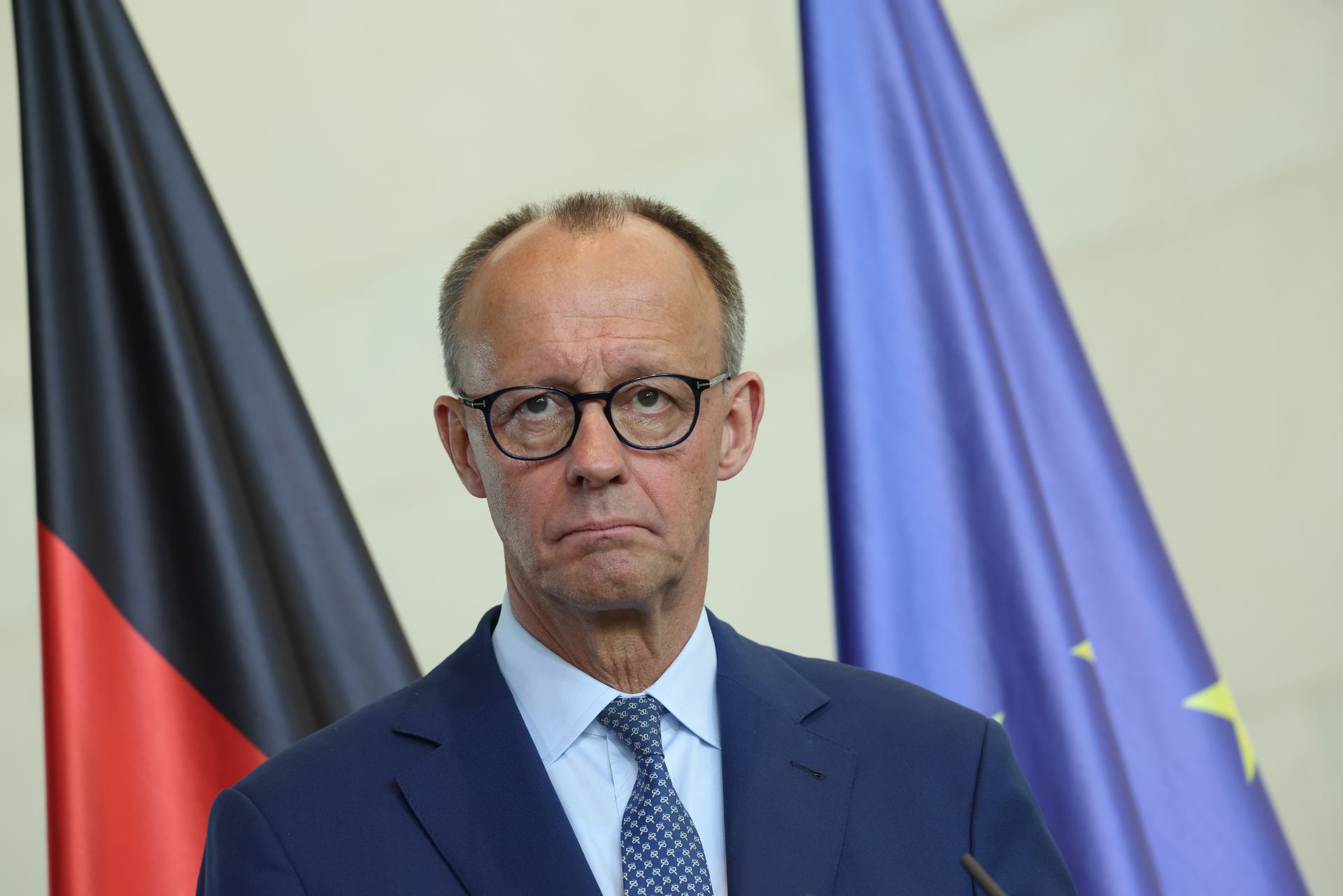

Four Alliance 90/Greens party members have sent an open letter to German Chancellor Friedrich Merz calling for a significant increase in military aid to Ukraine, Bild reported on July 5, citing a copy of the document.
The news comes as Russia’s expanded drone production has enabled Moscow to launch as many as 500 drones in a single night against Ukraine on multiple occasions each week.
The letter's authors — Robin Wagener, Sara Nanni, Sebastian Schafer, and Anton Hofreiter — demanded that certain budget items be adjusted, particularly regarding support for Ukraine. They believe that the planned increase in Germany's defense funding for Kyiv from $8.4 billion in 2024 to $9.8 billion in 2025 is insufficient, according to Bild.
The signatories emphasized the need to strengthen Ukraine's air defense systems urgently.
"Without further air defense and assured supplies, Russian dictatorship over Ukraine becomes more likely," the letter read.
The lawmakers also noted that the situation has deteriorated as Russia continues to carry out large-scale attacks on Ukraine, and the United States, for its part, has partially suspended its military aid.
The signatories reminded Merz that, thanks to the Greens party's support in the previous Bundestag, assistance to Ukraine had significantly increased.
Before becoming chancellor, Merz, elected for the CDU/CSU conservative alliance, signaled he could overturn the ban of his predecessor, Social Democrat Olaf Scholz, on delivering Taurus to Ukraine.
The Taurus is a powerful cruise missile capable of striking targets at a distance of 500 kilometers (300 miles), more than the long-range capabilities Ukraine received from other partners.
However, the German government has not approved sending Taurus missiles to Ukraine so far.
Ukraine has been using U.S.-made ATACMS for over a year, and U.K.-French Storm Shadow/SCALP for more than two, initially being allowed to deploy them only against Russian targets on Ukrainian territory.
Only in late 2024, the Biden administration and other allies eased the restrictions, allowing Ukraine to use long-range missiles against Russian military targets on Russian territory.
 The Kyiv IndependentNatalia Yermak
The Kyiv IndependentNatalia Yermak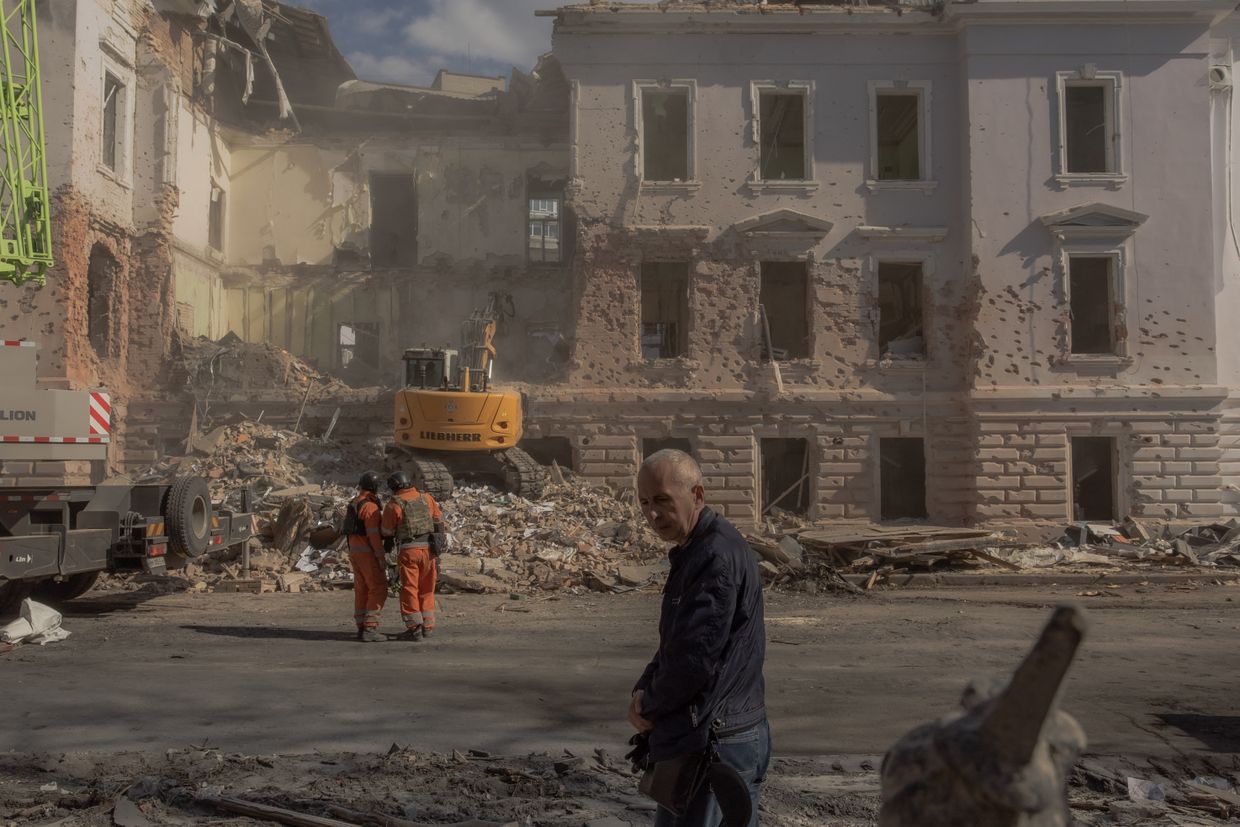
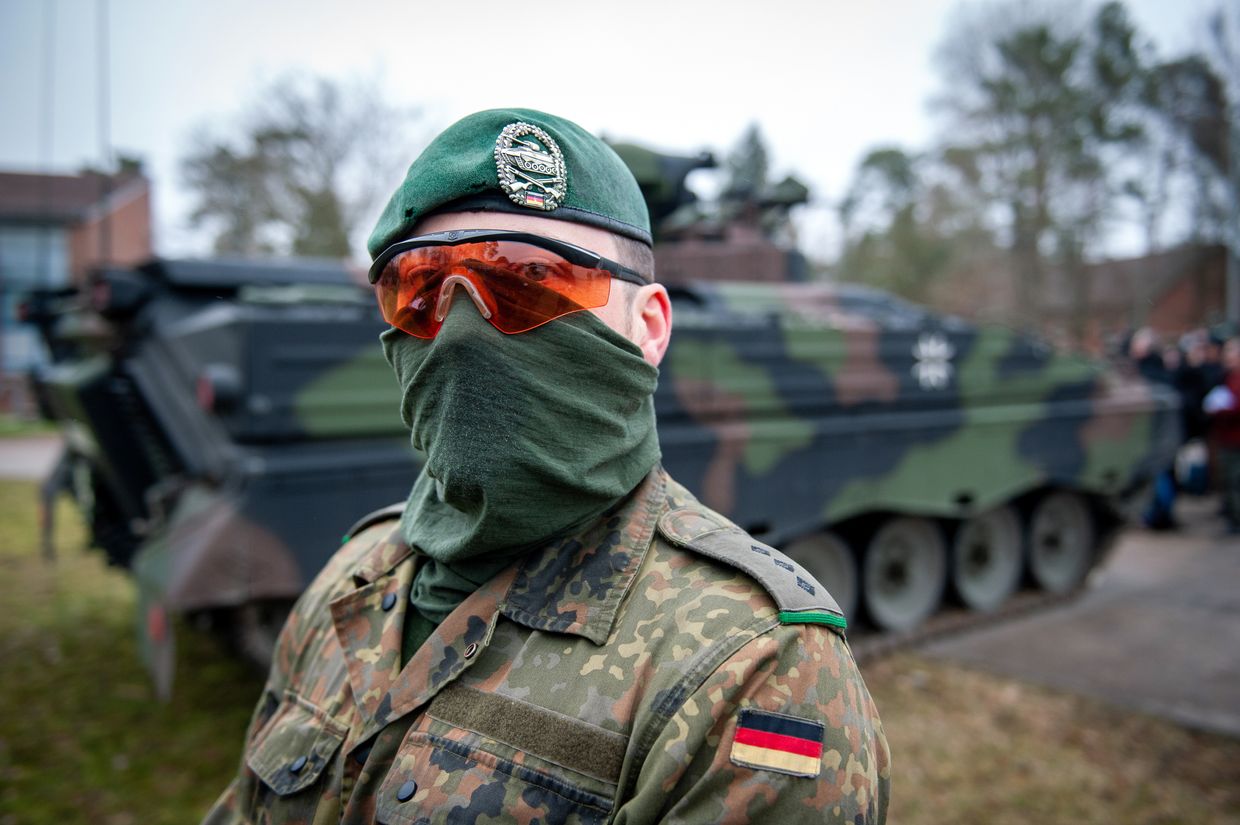

Germany is weighing a massive defense procurement plan worth up to 25 billion euros ($29.4 billion) to supply thousands of combat vehicles for NATO's expanding force structure, Bloomberg reported on July 4, citing unnamed sources familiar with the matter.
The proposed purchases are part of a broader pan-European effort to boost deterrence against Russia, as Western leaders warn of the growing risk of a large-scale war within five years.
Berlin is reportedly considering purchasing up to 2,500 GTK Boxer armored vehicles and up to 1,000 Leopard 2 battle tanks. The purchase would equip up to seven new brigades that Germany has pledged to form under NATO's force generation plans for the next decade.
The Leopard 2 tanks are produced by KNDS Deutschland and Rheinmetall, while the Boxer is made by ARTEC, a joint venture of the same companies. Leopard 2 tanks have been supplied to Ukraine and tested in combat.
Final pricing and quantities are still under negotiation, and the projected cost could fall below 25 billion euros ($29.4 billion) depending on procurement timelines and contract terms.
German Defense Minister Boris Pistorius and top Bundeswehr officials are reviewing the plans, with legislative approval expected by the end of the year, Bloomberg reported.
Germany has faced pressure from NATO and Washington to meet its alliance commitments, including the newly adopted pledge to spend at least 5% of GDP on defense by 2035.
The initiative, endorsed on June 25 at the NATO summit, reflects concern over Russia's wartime economy, military buildup, and destabilization efforts across Europe.
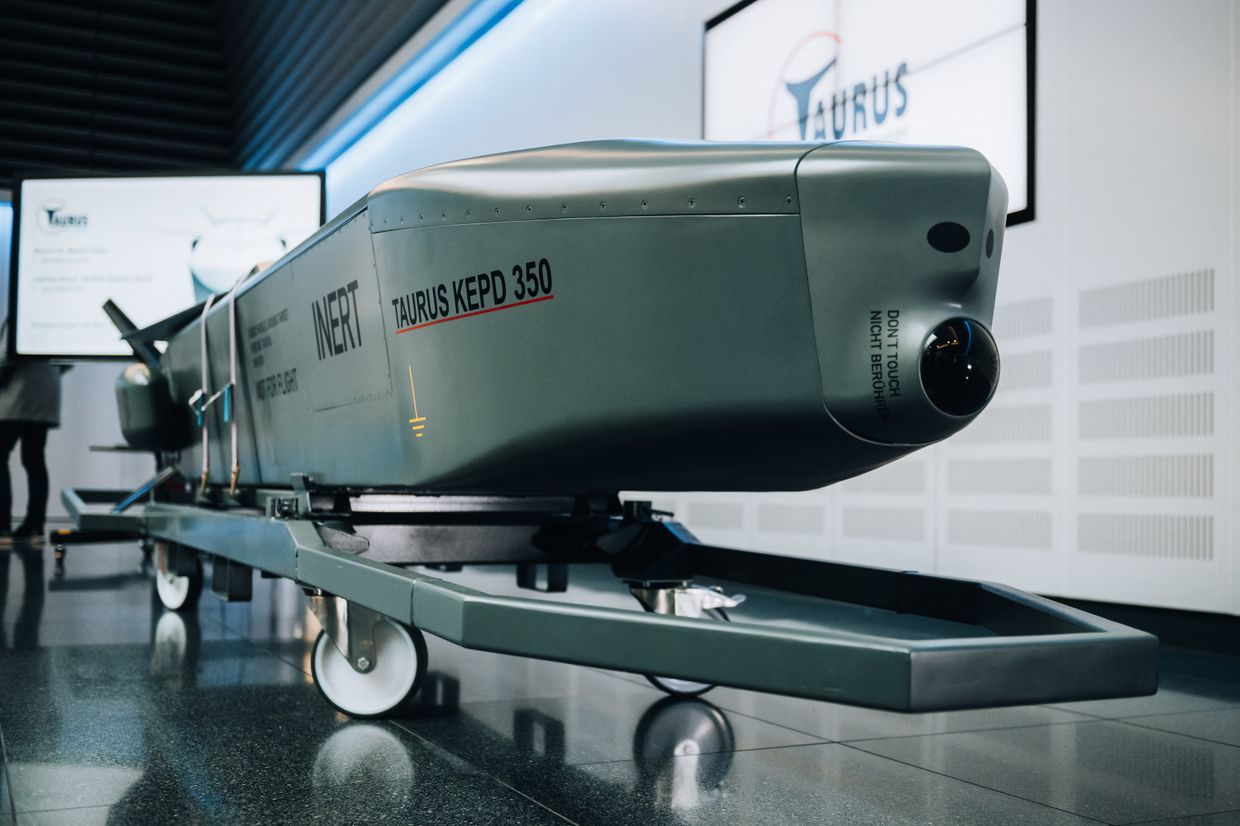

German Chancellor Friedrich Merz said on July 1 that the decision to supply Taurus cruise missiles to Ukraine remains under consideration but stressed that Germany will not become a party to the war.
"It has always been clear that if we supply the Taurus, this weapon will be used not by German soldiers, but by Ukrainians," Merz told Tagesschau. "By the way, the same applies to other cruise missiles supplied by the United Kingdom or France."
The Taurus is a powerful cruise missile capable of striking targets at a distance of 500 kilometers (300 miles) — a greater range than the long-range weapons Ukraine has received from other partners.
Speaking to the outlet, Merz highlighted the complexity of the Taurus system, noting that it requires extensive training before Ukrainian forces can operate it. In terms of range, speed, and payload, the Taurus missile is similar to the Storm Shadow, which is produced by MBDA’s French division. The key difference lies in the warhead design — Taurus can be programmed to detonate after penetrating fortified targets, such as bunkers or reinforced facilities.
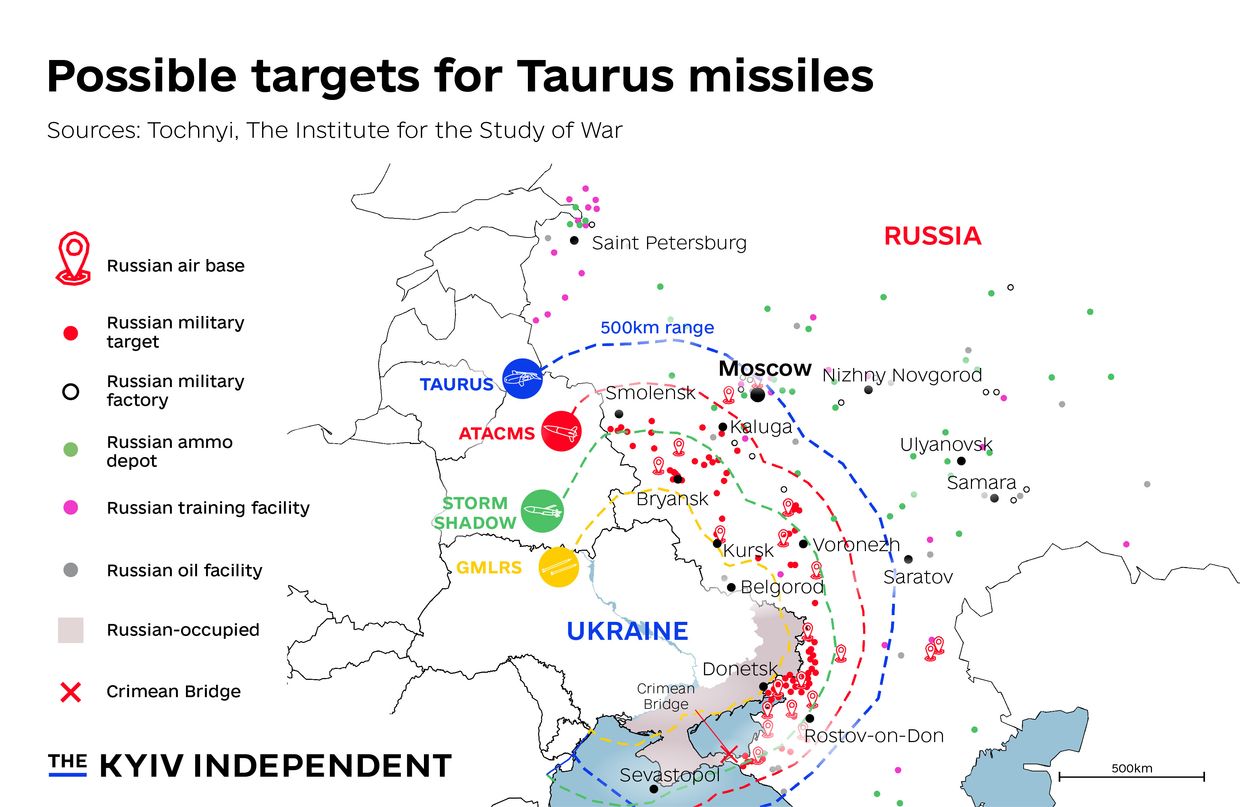
“The problem for us is that this system is extremely complex, and training soldiers on it takes at least six months. Are they already being trained? We haven't agreed on that yet,” he said. “I discussed this with President (Volodymyr) Zelensky, and I also raised it within the coalition. We haven’t started yet. It is and remains an option.”
The chancellor also added that Germany would no longer publicly disclose details about its military support to Ukraine in order to prevent Moscow from assessing the full scope of Western assistance.
Since Russia launched its full-scale invasion of Ukraine in February 2022, Germany has provided Kyiv with approximately 47.8 billion euros (about $51.8 billion) in total bilateral support, making it Ukraine’s second-largest country donor. This aid includes military equipment, humanitarian assistance, support for refugees, infrastructure repair, and financial aid for energy and winter relief, with military support alone totaling around 28 billion euros ($30 billion).
 The Kyiv IndependentAsami Terajima
The Kyiv IndependentAsami Terajima
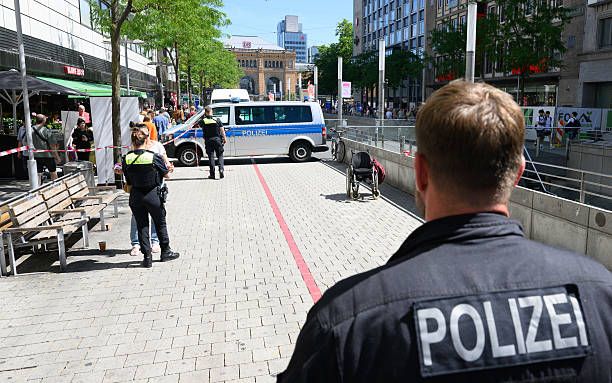

A 32-year-old Ukrainian woman and her 1-year-old daughter were found dead near their home in the German city of Dorsten, North Rhine-Westphalia, on June 29, according to a joint statement from the Essen Public Prosecutor's Office and the Recklinghausen Police.
According to the statement released on June 30, the autopsy results confirmed that both victims died from violent causes. The bodies were discovered in the Holsterhausen district of Dorsten in Germany.
Later that same evening, a 16-year-old Ukrainian boy who also resides in Dorsten appeared at the crime scene and admitted to involvement in the killings, German authorities said. He was arrested on the spot, and a criminal investigation is ongoing.
Ukraine's Foreign Ministry confirmed to RBK-Ukraine that the Ukrainian woman and her daughter were murdered in Germany.
Ukraine's Consulate in Dusseldorf said it had contacted German law enforcement agencies for more information and was working to reach the relatives of both the victims and the detained teenager. The consulate reportedly confirmed that the case is under special supervision by the diplomatic mission.
German authorities said the crime scene was cordoned off for collecting evidence until the evening hours of June 29. They are now analyzing multiple tips and pieces of evidence submitted by the public.
The relationship between the teenage suspect and the victims has not yet been confirmed by investigators.
Earlier in June, a 46-year-old Ukrainian woman and her 6-year-old daughter were found murdered in the city of Leuven, Belgium. Both victims were found in the fire and had previously suffered stab wounds.
The 16-year-old son of the Ukrainian woman has confessed to fatally injuring his family and setting their home on fire. The Leven prosecutor's office said the boy admitted to the crimes after five hours of questioning.
 The Kyiv IndependentChris York
The Kyiv IndependentChris York
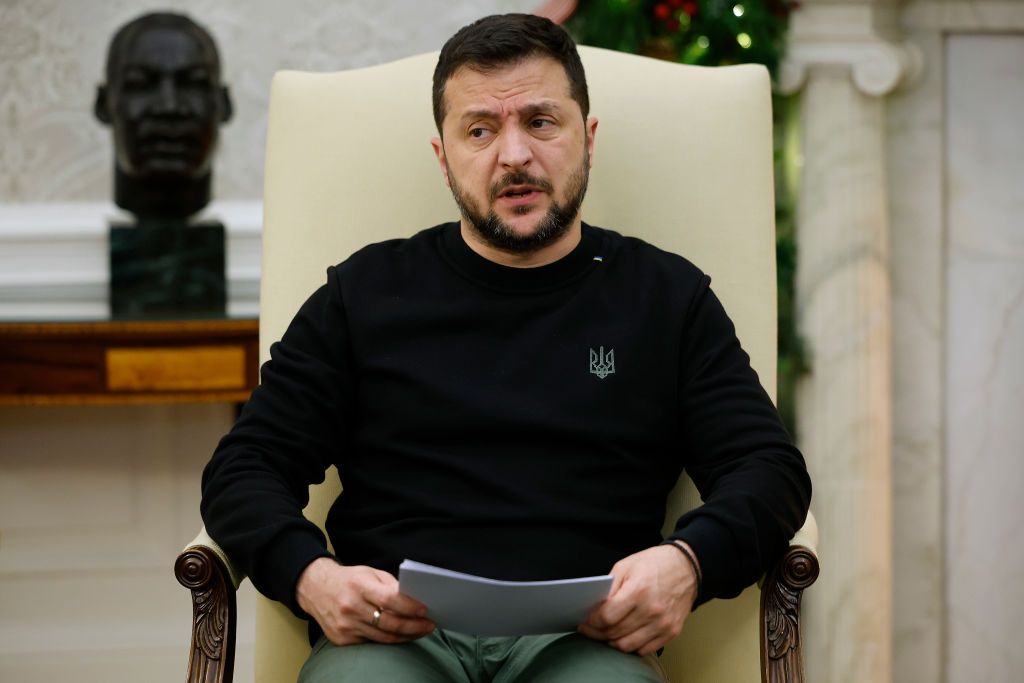

President Volodymyr Zelensky and German Foreign Minister Johann Wadephul met in Kyiv on June 30, where the two leaders discussed Germany supplying additional IRIS-T air defense systems, joint weapons production, and strengthening sanctions against Russia, Zelensky said.
Wadephul earlier said Germany is working with its defense industry, European allies, and the U.S. to secure more air defense systems for Ukraine.
"We are going down every path available... The German defense industry is trying to expand its capacity. We're speaking with our European partners, and I believe we must also move forward with the United States," he said.
Zelensky met with executives of German defense companies alongside Wadephul during the visit to Ukraine's capital.
"We discussed sanctions pressure on Russia, the potential for supplying new IRIS-T systems, and joint weapons production — both in Ukraine and in Germany," Zelensky said in a post to social media.
Zelensky noted Germany signalled it believes that Ukraine's future is in NATO amid Russia's war against Ukraine.
"We will continue to develop relevant military hubs and increase the presence of German companies in Ukraine. We had an in-depth discussion on interceptor drones. I am grateful for the willingness to help," Zelensky said.
Earlier in the visit, Wadephul noted that he remains in close contact with German Defense Minister Boris Pistorius to assess whether existing systems from Germany's own stockpiles can be redirected to Ukraine.
 The Kyiv IndependentDominic Culverwell
The Kyiv IndependentDominic Culverwell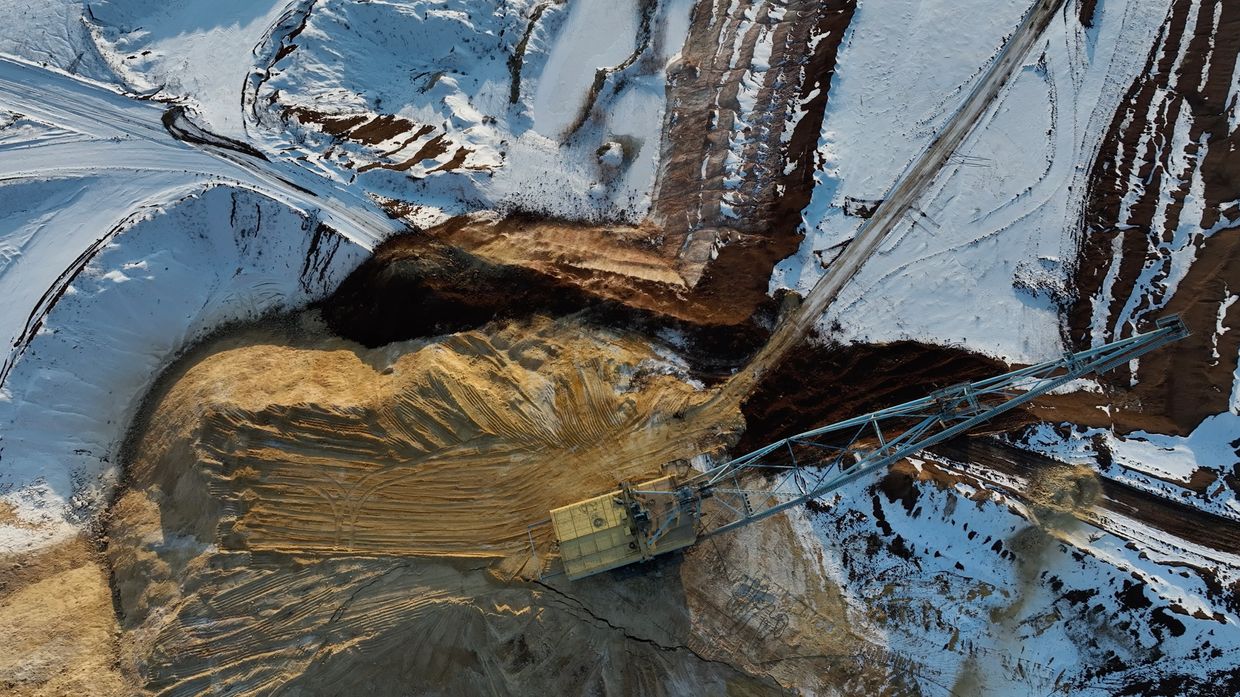
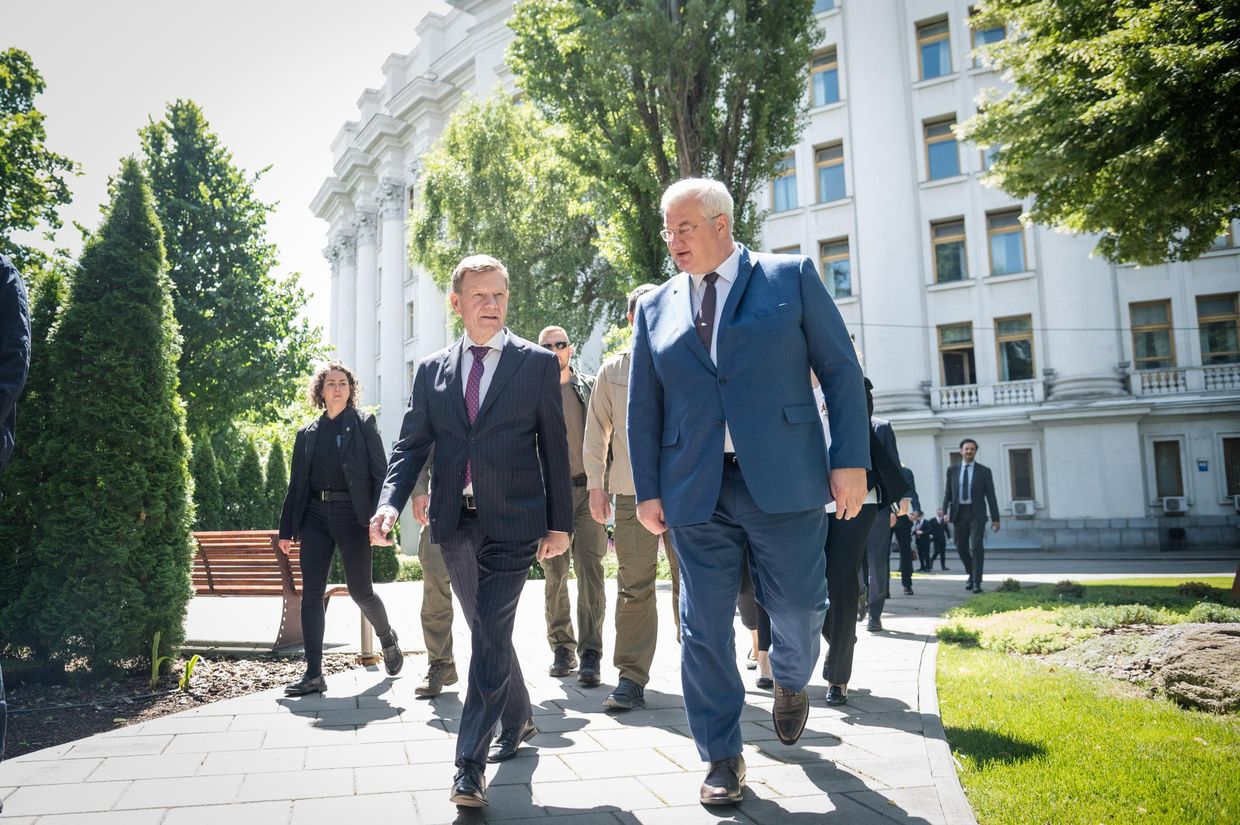

German Foreign Minister Johann Wadephul pledged on June 30 that Berlin is exploring "every possible path" to provide Ukraine with additional air defense systems, amid intensifying Russian missile and drone attacks, according to RBK-Ukraine.
Speaking at a press conference during his visit to Kyiv, Wadephul said Germany is working with its defense industry, European allies, and the U.S. to urgently secure more systems for Ukraine's air shield.
"We are going down every path available," Wadephul said. "The German defense industry is trying to expand its capacity. We're speaking with our European partners, and I believe we must also move forward with the United States."
He added that he remains in close contact with German Defense Minister Boris Pistorius to assess whether existing systems from Germany's own stockpiles can be redirected to Ukraine.
Wadephul's visit came just a day after Russia launched its largest aerial assault on Ukraine to date, firing 477 drones and 60 missiles in a 24-hour period. In a video message posted on social media earlier on June 30, the German minister described Ukraine as "a country once again haunted by war," and reaffirmed Germany's solidarity.
"Germany stands by Ukraine," Wadephul said. "We must not allow freedom to be lost here. We have to support this country and ensure that a ceasefire is finally achieved. (Russian President Vladimir) Putin must realize he cannot continue this war and must negotiate a peace solution."
Guten Morgen aus der Ukraine 🇺🇦 pic.twitter.com/mbvfuE0niz
— Johann Wadephul (@AussenMinDE) June 30, 2025
Ukrainian Foreign Minister Andrii Sybiha welcomed Wadephul's visit in a post on X, saying the two discussed how to counter Russian aggression and deepen bilateral ties.
Glad to welcome my German colleague and friend @AussenMinDe Johann Wadephul.
— Andrii Sybiha 🇺🇦 (@andrii_sybiha) June 30, 2025
We spoke about steps to counter Russian aggression against Ukraine, neutralise the threats posed to Europe by the aggressive Russian regime, and ways to further strengthen the ties between our nations.… pic.twitter.com/38ZX97SfXb
Sybiha said they also spoke about Germany's role in Ukraine's development of long-range capabilities and drones, calling it "win-win cooperation"— as well as Berlin's support for the 18th EU sanctions package and Ukraine's path to EU membership.
"I am grateful to Minister Wadephul for his moral clarity and personal contribution to Ukraine's resilience," Sybiha added.
Wadephul is expected to meet with President Volodymyr Zelensky later during his visit.
The German foreign minister emphasized that witnessing the destruction firsthand is critical to understanding Ukraine's suffering and the urgency of sustained international support.
"This is indeed a difficult situation," Wadephul said. "And that is why German solidarity is so important right now."
 The Kyiv IndependentFrancis Farrell
The Kyiv IndependentFrancis Farrell
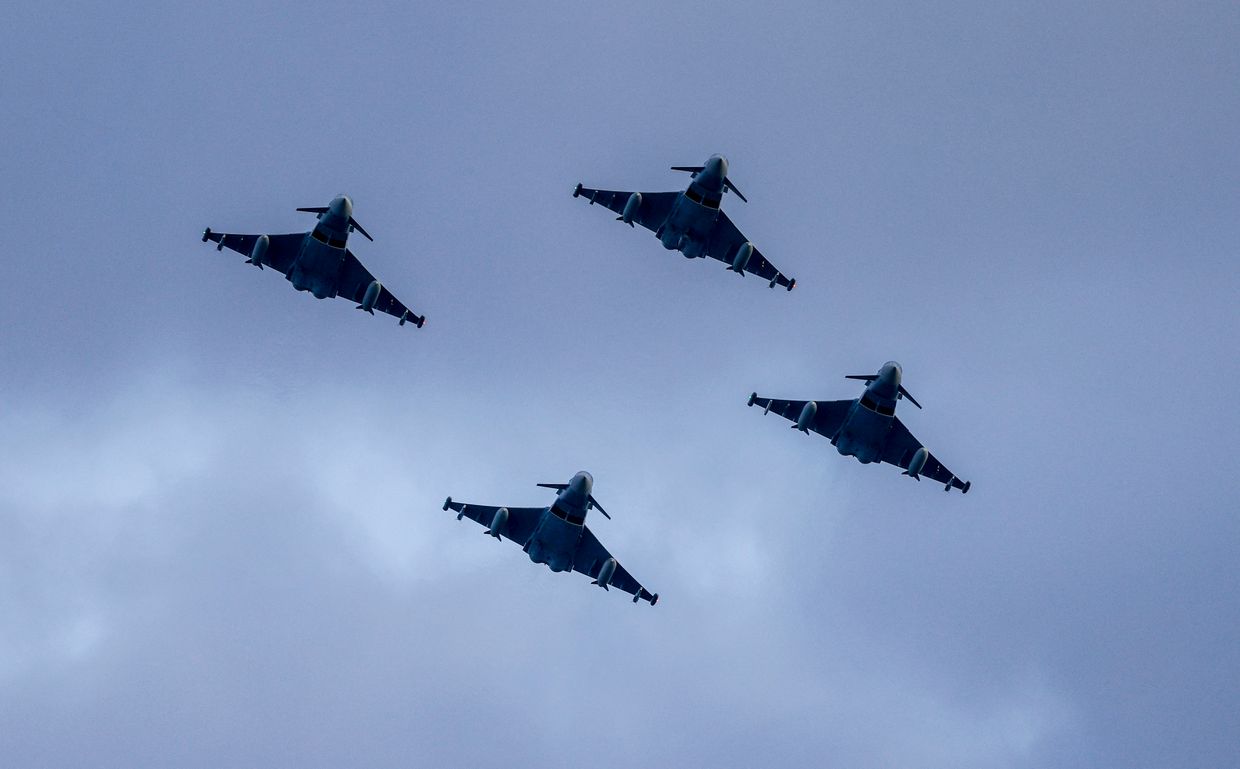

German fighter jets were scrambled to intercept a Russian Il-20 reconnaissance aircraft over the Baltic Sea near NATO airspace on the morning of June 27, the German tabloid Bild reported.
The incident adds to a series of aerial provocations reported by NATO allies since the start of Russia's full-scale invasion of Ukraine in 2022 as Moscow is suspected of using the aircraft to spy on the alliance's positions.
The Russian Il-20M, which took off from Kaliningrad with its transponder switched off, was headed west toward international airspace near Poland and Germany when it was detected by NATO radar systems.
NATO alerted the German Armed Forces’ Quick Reaction Team (QRT), prompting the launch of two Eurofighter jets to intercept the aircraft.
The German jets made visual contact with the Russian plane approximately 100 kilometers off the German coast and took a photograph of it. Despite the interception, the Il-20M did not alter its course.
The Russian aircraft eventually veered north, just 40 kilometers from the Baltic Sea island of Usedom, avoiding a breach of German airspace.
According to Bild, this was the ninth such interception mission conducted by German forces in 2025.
As Russia continues its aggression against Ukraine and poses an increasing threat to NATO, German Chancellor Friedrich Merz said in an interview with Süddeutsche Zeitung published on June 27 that he would refrain from phone calls with Russian President Vladimir Putin given the intensified attacks on Ukraine.
Merz’s predecessor, Olaf Scholz, was the first EU leader from a country supporting Ukraine to resume direct contact with Putin since the start of the full-scale invasion, speaking with him by phone in November 2024.
 The Kyiv IndependentKateryna Denisova
The Kyiv IndependentKateryna Denisova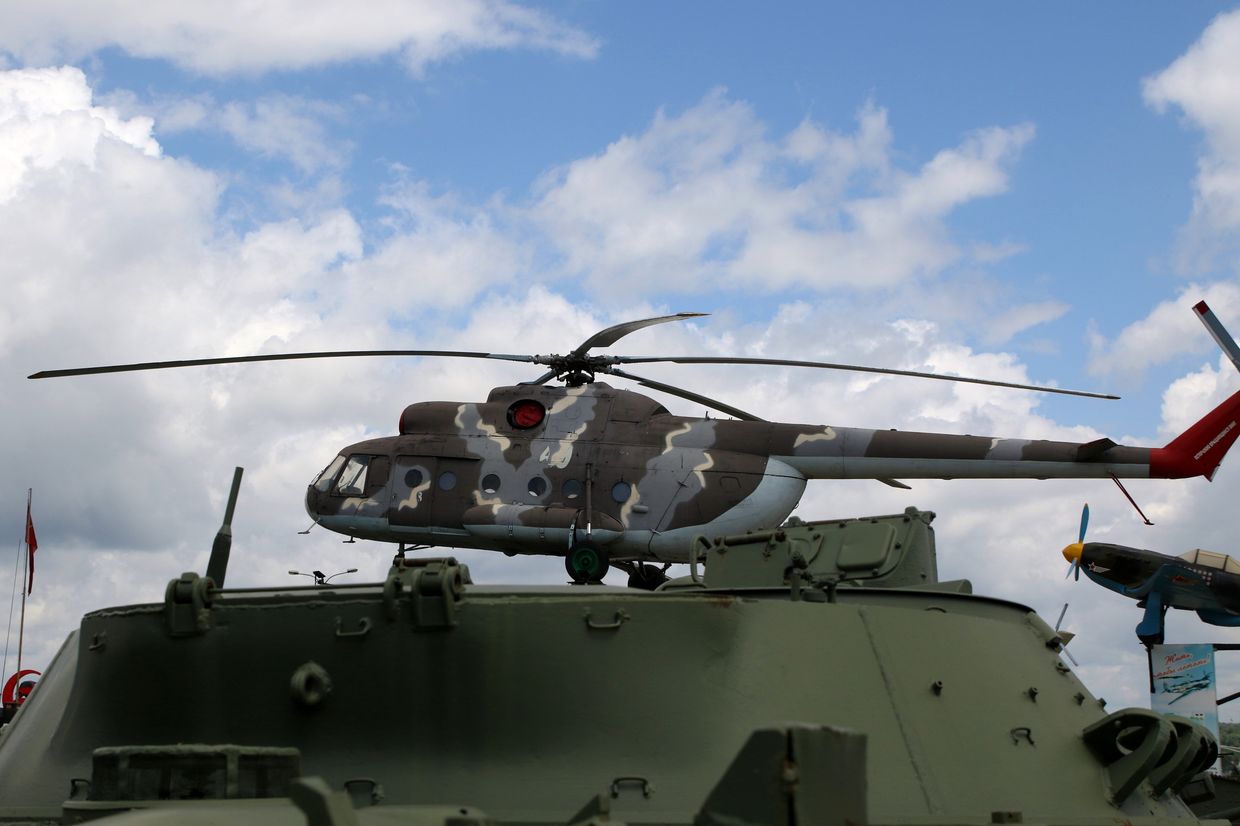


Germany aims to prioritize defense spending in the next EU budget while firmly opposing any increase in national contributions, according to a position paper obtained by the Financial Times (FT).
As the bloc’s largest economy and top net contributor, Berlin wants EU funds to support joint arms procurement and help expand production capacity among European weapons manufacturers.
The paper reportedly reflects Germany’s broader shift toward higher domestic military spending in response to Russia’s ongoing threat and amid calls by U.S. President Donald Trump for Europe to shoulder more of its own defense.
Berlin argues the EU budget should also fund dual-use technologies, military transport corridors, and other security-related initiatives despite current treaty restrictions on defence spending from the common budget, according to FT.
To free up funds for these priorities, Germany proposes cutting administrative costs and simplifying the EU budget structure. The government supports reducing the number of programes, granting the European Commission more flexibility to shift funds, and focusing spending on strategic areas such as cross-border infrastructure, energy security, digitalisation, and innovation.
Germany also opposes any extension of the EU’s post-Covid joint borrowing programme, stressing that repayments for the 800 billion euro fund must begin in 2028 as scheduled. While Berlin is open to discussing new EU-level revenue sources such as a carbon border levy or minimum corporate tax, it continues to reject an increase in direct national contributions to the budget, which currently total about 1% of EU GDP.
 The Kyiv IndependentDmytro Basmat
The Kyiv IndependentDmytro Basmat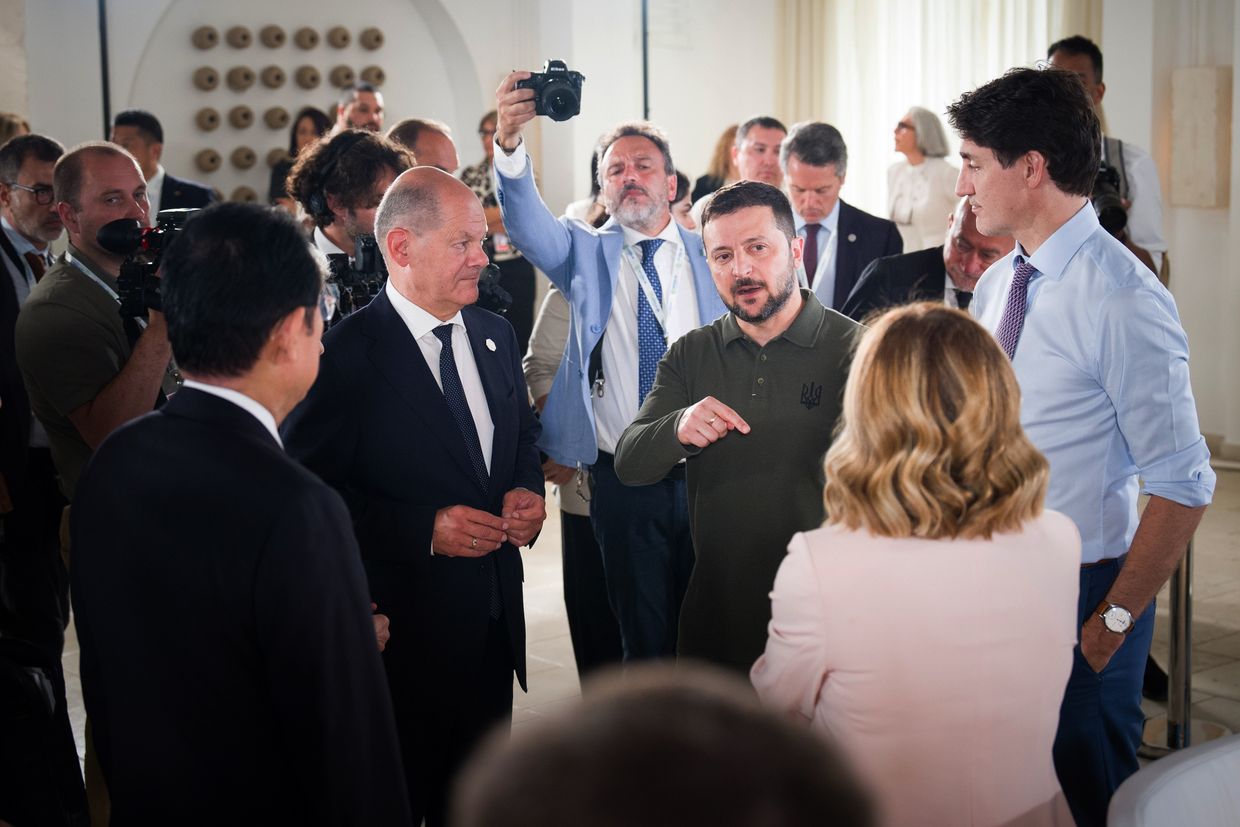
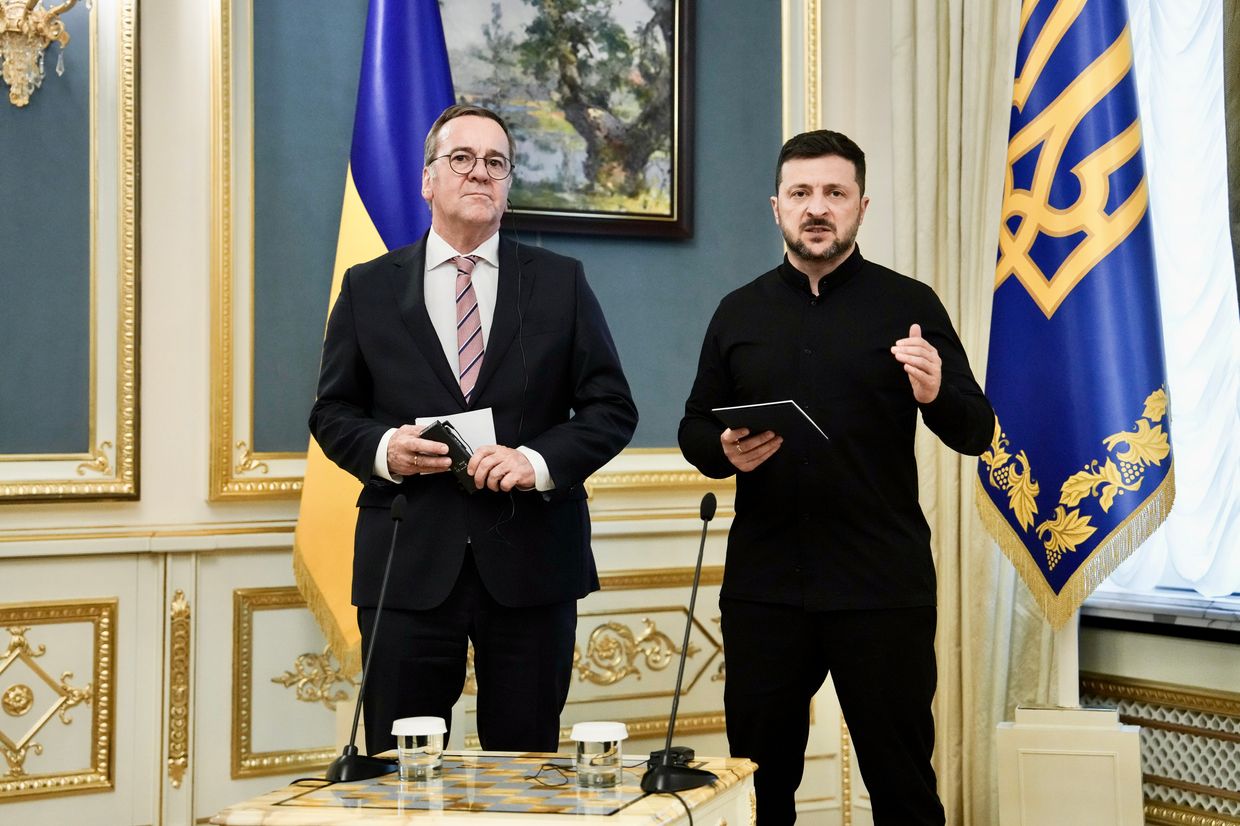

Editor's note: This story has been updated to include Germany's announcement to supply Ukraine with $2.2 billion in additional military aid.
Germany will deliver new IRIS-T air defense systems to Ukraine under a three-year supply plan, President Volodymyr Zelensky said during a joint press conference with German Defense Minister Boris Pistorius, who added Berlin has no plans to provide Taurus long-range missiles.
The announcement comes amid escalating Russian aerial assaults, including a June 10 missile and drone strike on Kyiv, one of the largest since the start of the full-scale invasion.
"We are grateful for the supply of IRIS-T air defense systems," Zelensky said on June 12. "We understand that deliveries are currently being planned... for the next three years. This is very important assistance."
The IRIS-T is a German-made medium-range surface-to-air missile system capable of intercepting drones, aircraft, and cruise missiles.
Pistorius confirmed the delivery timeline but firmly ruled out the possibility of sending Taurus missiles — weapons Kyiv has repeatedly requested to strike deep into Russian territory.
"You asked me whether we are considering this, and my answer is no," Pistorius said.
Before taking office, German Chancellor Friedrich Merz signaled openness to lifting former Chancellor Olaf Scholz's ban on the missiles. That stance has not yet resulted in a policy shift.
Ukraine has already received long-range missiles — including ATACMS from the U.S. and Storm Shadow and SCALP from the U.K. and France. Initially restricted to use within Ukrainian territory, Western allies only began easing those limitations in late 2024.
Germany is Ukraine's largest military donor in Europe. Pistorius said that Berlin will provide 9 billion euros ($10.4 billion) in aid this year, with investments in defense production being considered. The total includes an additional commitment in military aid worth 1.9 billion euros ($2.2 billion).
"Today, we discussed that this aid will continue," he said. "We agreed on additional investments in production... both in Ukraine and in Germany."
Zelensky visited Berlin on May 28 for talks with Merz, part of an ongoing effort to bolster Ukraine's defense industry amid uncertainty over U.S. support under President Donald Trump.
 The Kyiv IndependentKollen Post
The Kyiv IndependentKollen Post